#the specific context is important and can’t just changed and not impact the story in any way
Text
A little rant about ok vs great character ‘breaking scenes’
Full disclosure, 1) I’m not a writer this is just my opinion, and 2) I really enjoyed hazbin hotel this isn’t slander power to the hazbin fandom right now shit is crazy I’m just talking about writing
Ok so, I’m sure that the pacing and writing issues in Hazbin are kinda obvious, they don’t take away from the show and I enjoyed it a lot, but it’s there. In my opinion episode four was the show at its best, a lot of people I’ve spoken to agree that episode four is one of the strongest ones (I haven’t seen 7 and 8 yet tho so idk) and specifically angels ‘breaking point’ scene outside the bar/club. Scenes like that are really important for character building, because they, in essence, show you how the characters are feeling. Angels scene was okay, it was impactful, but it wasn’t great, so I’m gonna compare it to one or two other scenes that serve a similar purpose and explain why. (Here’s a hint it’s about subtlety if you couldn’t tell when you watched it)

“This is my escape, where I can forget about it all and how much I hate…everything”
That’s a great line, it’s impactful, but god it’s lazy. Like I get it, but it’s kind of a nothing line, yknow? Like, its abstractttt, but think about it within the context of angel’s character and it doesn’t really mean anything. It’s not subtle, and the key (in my opinion emphasis on opinion) to good writing, especially for big character break scenes, is subtly. This scene is relying so heavily on the shock factor of Angels fucked up storyline to carry all the emotional weight. It’s so horrible that it just has to be impactful, but that means it doesn’t really hit any better or worse with context, which if you really want a good breakdown scene for, it kinda has to. It just kjnda….is a line. That’s this whole scene in a nutshell. It hits, its sad and it’s impactful, but only because his story literally makes it so by default, saying he hates everything doesn’t mean anything to his character. If that doesn’t really make sense, lemme put it like this; if you want a really good scene serving the purpose that this one is trying to achieve, it needs to hit better or hit differently the second time you watch it. Rewatch hazbin again and it’s the same scene, and the same can be said for most of it’s dialogue actually, which while isn’t detrimental to the story, shows that most of its dialogue isn’t really serving a purpose to the story, if each line mattered then each line should mean something once you know the whole story, if that makes sense.
Ok, now I’m gonna compare it to a much better scene from Helluva boss (to prove that Vivzie can do this stuff)
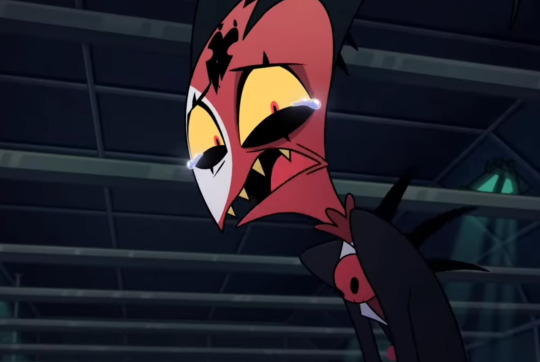
“You didn’t even care-!”
“I did care!!”
Bro ok, instantly this is better. Like this whole scene is so much better it’s a little weird that they were written by the same person. Why? Well, obviously on first watch it’s impactful, it’s got that ‘ghasp he left him to die?!?’ Shock factor, but the real shit comes from the sweet sweet context. What do we know about Blitzø? He’s scared of love, and everyone he has ever cared about he has hurt. He pretends he doesn’t care (a lot like Angel) all the time because he can’t be vulnerable and he can’t let people close to him. He does care. and the more you know about Blitzø the more that like hits because of it. Angel has a similar scream line when he shouts ‘it’s not an act! It’s who I need to be….’ But the problem with that one is that it doesn’t change or feel any better with more or less context, because we know everything we need to know about Angel already. The audience isn’t getting the same sense of satisfaction or payoff for these lines with Angel like they are for Blitzø because Helluva isn’t just telling you about these characters, it’s showing you. Blitzø could have gone ‘I didn’t leave you to die! I had to make a difficult choice and it haunts me and this the effect it had on me and blah blah blah’ but he doesn’t, he panics and tries to explain and he keeps repeating in the scene that he was trying to get help but he can’t explain it all and he just can’t. That’s good writing. Because where Angel jumps into this fully formed explanation of why he’s acting this way, Blitzø doesn’t because Blitzø can’t. Show not tell yknow?
Blitzø’s scene feels different when you know more about his character, to put it simply.
A really good example of this kinda writing is Steven universe, I genuinely can’t explain it unless you’ve seen it but

“Well I think you’re pretty great”
I don’t even have the words for how brilliant this scene is, every time you learn something new about pearl this scene just gets better, it’s so fucking good. She doesn’t even say anything, its all implied and I love it.
However, I am aware Helluva did have a season and a half to flesh out Blitzø, hazbin had three episodes,so I admit a lot of this is just down to the pacing getting in the way, but my point still stands.
Ok I’m going to sleep it’s 12:07 wtf
#hazbin hotel#hazbin characters#helluvaverse#cartoon analysis#character analysis#hazbin hotel analysis
4 notes
·
View notes
Text
The Curse of the Main Character
Main characters. They’re the best, aren’t they? Except they’re not. Think of who your favourite character is from any number of pieces of entertainment media.
If you loved Lord of the Rings, it’s likely Frodo wasn’t your favourite character. No, it was probably Sam, Éowyn, Pippin, etc. Or maybe you prefer Star Wars, but let’s face it: Han and Leia were always more interesting than Luke.
Or perhaps you’re more into the MCU and side characters that never got their own solo stories like Natasha/Black Widow were your favourite, up until she got her own movie. Then she mysteriously fell into the same vat of main character blandness that Steve, Tony, etc had fallen prey to before. And now her sister Yelena was the side character stealing the show, like Natasha once was.
Hell, maybe you were a Nickelodeon kid who watched Victorious and adored Jade and Kat, but despised Tori due to the crime that she simply wasn’t as interesting or fun.
See, in any given story, (in my experience) your favourite characters are the ones that have the luxury of not being imprinted on by the author and thus are able to fully develop into more interesting beings with flaws and strengths that have nothing to do with the creator’s own personal perception of what it would look like for them specifically to be the protagonist. Or rather, how the creator(s) assumes the viewer/player/reader/etc would relate to their protagonist. Instead of just writing a character that would actually be effective within the context of the story.
I’m dubbing this phenom the Main Character Curse. It applies to so many different forms of media. Think of your favourite romance novel series such as Immortals After Dark or even Addicted/Calloway Sisters, in which every instalment is a standalone story in the same world and each book focuses on a new couple. Now, which book in that series is your favourite? Because I can almost guarantee it’s not the first book.
The first book that focuses so heavily on the couple that was clearly meant to be the magnum opus of greatness but fell short compared to almost every other book/couple in the series. Due to the fact that other characters in the series had to earn their stories. The couple from the first book didn’t need to be interesting or even particularly likeable. They just needed to be two people the author could fantasize about.
Whereas all of those other side characters in the first book had to earn their right to sequels and spin-offs by being the funniest, meanest, smartest, most fun, etc. They needed to prove themselves to the reader, when the protagonist did not.
Main characters don’t have to do anything (as of the writing of the story) to be worthy of being protagonists of said story. However, side characters have to earn their place in the story by actually serving the plot or developing in a meaningful way themselves.
The protagonist just needs to be a vessel for the consumer, no matter how dull or bland that vessel may be. Any other character in that same story has to be important or impactful in some way. Thus, they have the ability to develop, grow, shrink, or change drastically without it affecting the story to the point that it shifts away from the original plot-line completely.
Because even if that character dies or changes completely, the story will go on. The same cannot be said of the main character. Who has to be relatively stable and grounded enough throughout the whole story to remain the conduit for the reader/viewer/player/etc.
The side character has the luxury of being untethered to expectation and thus their journey is only limited to whatever the plot can throw at them.
So, why is the main character that way to begin with? The simple answer: the author can’t help but want to be the main character themselves, so they put too much of themselves into that character. Which limits what that protagonist experiences to what the writer themselves can relate to.
Which then immediately restricts the protagonist to a rigid box of typical self-insert godliness, or worse: boringness. Which is also likely why so many heroes/heroines seem too similar to cringy fanfic Y/N for comfort.
I know when I was around twelve years old I got the Divergent trilogy boxed set, and I noticed something a little odd. In the first book, the heroine Tris has long hair, and lo and behold; the author in the photo at the back of the book had the exact same hair style. Then, in the second book the heroine cuts her hair short, and oh! The author so happened to now have the exact same haircut in her updated author photo at the end of the book. The heroine’s hair changes a little bit again by book three, and (shocker) so does the author’s hair.
It’s almost like the creator was projecting onto the protagonist and accidentally constructed and ultimately hindered her main character in the process.
Are there circumstances where this doesn’t happen? Absolutely, but they are few and far between. Protagonists such as Percy Jackson and Aelin Galathynius prove that the main character of a story can be the best character in that same story.
However, these protagonists are few and far between, and we definitely need more of them. Though as stated above, this is complicated and difficult for a multitude of reasons.
Perhaps a temporary goal is to feature multiple main characters at once with no clear outlier, such as the Umbrella Academy. That remedies the issue of the protagonist being a typical hero/heroine by making every main character weird, strange, and fully fleshed out.
Or the Legend of Vox Machina. Which also has no definitive main character, because it has the unique luxury of originating from a tabletop RPG campaign in which every character was role-played by a different individual who was trying to be the main character in their own distinct and original way.
A different twist on the multiple protagonist approach involves something like what The Boys tv show does. Which highlights Billy, Hughie and Homelander as main characters, but gives plenty of other characters the main character spotlight during various different story arcs and episodes.
Regardless, sometimes I just want a story that has a single definitive protagonist. And every once in a while I’ll stumble upon an absolute treasure of a story, like Ted Lasso. In which the main character is amazingly written and portrayed, but all the secondary and tertiary characters are every bit as likeable and riveting.
Because it is so rewarding when stories can fully deliver on every bit of their potential instead of leaving you wishing they fulfilled what they teased.
All in all, I want less writers to live vicariously through their protagonists, and more writers to consider writing more bravely, oddly and complexly. Even if that means their protagonist isn’t the most beautiful or powerful or special.
Because no matter what, I’ll take a character that is the most likeable or interesting over the character that is the most special, any day. What about you? Let me know your thoughts!
#writing#reading#romance writer#fantasy writing#writers#film writing#tv writing#novel writing#protagonist#side character energy#main character#main character energy#villain era#character traits#character tropes#writing advice#media analysis#entertainment media#film and tv#film analysis#novel analysis#worst character#author advice#character archetypes#tua#the legend of vox machina#ted lasso#Percy Jackson#tlotr#aelin galathynius
181 notes
·
View notes
Text
What Does Our "Motivations” PSA Mean?
@luminalalumini said:
I've been on your blog a lot and it has a lot of really insightful information, but I notice a theme with some of your answers where you ask the writer reaching out what their 'motivation for making a character a certain [race/religion/ethnicity/nationality] is' and it's discouraging to see, because it seems like you're automatically assigning the writer some sort of ulterior motive that must be sniffed out and identified before the writer can get any tips or guidance for their question. Can't the 'motive' simply be having/wanting to have diversity in one's work? Must there be an 'ulterior motive'? I can understand that there's a lot of stigma and stereotypes and bad influence that might lead to someone trynna add marginalized groups into their stories for wrong reasons, but people that have those bad intentions certainly won't be asking for advice on how to write good representation in the first place. Idk its just been something that seemed really discouraging to me to reach out myself, knowing i'll automatically be assigned ulterior motives that i don't have and will probably have to justify why i want to add diversity to my story as if i'm comitting some sort of crime. I don't expect you guys to change your blog or respond to this or even care all that much, I'm probably just ranting into a void. I'm just curious if theres any reason to this that I haven't realized exists I suppose. I don't want y'all to take this the wrong way because I do actually love and enjoy your blog's advice in spite of my dumb griping. Cheers :))
We assume this is in reference to the following PSA:
PSA to all of our users - Motivation Matters: This lack of clarity w/r to intent has been a general issue with many recent questions. Please remember that if you don’t explain your motivations and what you intend to communicate to your audience with your plot choices, character attributes, world-building etc., we cannot effectively advise you beyond the information you provide. We Are Not Mind Readers. If, when drafting these questions, you realize you can’t explain your motivations, that is likely a hint that you need to think more on the rationales for your narrative decisions. My recommendation is to read our archives and articles on similar topics for inspiration while you think. I will be attaching this PSA to all asks with similar issues until the volume of such questions declines.
We have answered this in three parts.
1. Of Paved Roads and Good Intentions
Allow me to give you a personal story, in solidarity towards your feelings:
When I began writing in South Asia as an outsider, specifically in the Kashmir and Lahore areas, I was doing it out of respect for the cultures I had grown up around. I did kathak dance, I grew up on immigrant-cooked North Indian food, my babysitters were Indian. I loved Mughal society, and every detail of learning about it just made me want more. The minute you told me fantasy could be outside of Europe, I hopped into the Mughal world with two feet. I was 13. I am now 28.
And had you asked me, as a teenager, what my motives were in giving my characters’ love interests blue or green eyes, one of them blond hair, my MC having red-tinted brown hair that was very emphasized, and a whole bunch of paler skinned people, I would have told you my motives were “to represent the diversity of the region.”
I’m sure readers of the blog will spot the really, really toxic and colourist tropes present in my choices. If you’re new here, then the summary is: giving brown people “unique” coloured eyes and hair that lines up with Eurocentric beauty standards is an orientalist trope that needs to be interrogated in your writing. And favouring pale skinned people is colourist, full stop.
Did that make me a bad person with super sneaky ulterior motives who wanted to write bad representation? No.
It made me an ignorant kid from the mostly-white suburbs who grew up with media that said brown people had to “look unique” (read: look as European as possible) to be considered valuable.
And this is where it is important to remember that motives can be pure as you want, but you were still taught all of the terrible stuff that is present in society. Which means you’re going to perpetuate it unless you stop and actually question what is under your conscious motive, and work to unlearn it. Work that will never be complete.
I know it sounds scary and judgemental (and it’s one of the reasons we allow people to ask to be anonymous, for people who are afraid). Honestly, I would’ve reacted much the same as a younger writer, had you told me I was perpetuating bad things. I was trying to do good and my motives were pure, after all! But after a few years, I realized that I had fallen short, and I had a lot more to learn in order for my motives to match my impact. Part of our job at WWC is to attempt to close that gap.
We aren’t giving judgement, when we ask questions about why you want to do certain things. We are asking you to look at the structural underpinnings of your mind and question why those traits felt natural together, and, more specifically, why those traits felt natural to give to a protagonist or other major character.
I still have blond, blue-eyed characters with sandy coloured skin. I still have green-eyed characters. Because teenage me was right, that is part of the region. But by interrogating my motive, I was able to devalue those traits within the narrative, and I stopped making those traits shorthand for “this is the person you should root for.”
It opened up room for me to be messier with my characters of colour, even the ones who my teenage self would have deemed “extra special.” Because the European-associated traits (pale hair, not-brown-eyes) stopped being special. After years of questioning, they started lining up with my motive of just being part of the diversity of the region.
Motive is important, both in the conscious and the subconscious. It’s not a judgement and it’s not assumed to be evil. It’s simply assumed to be unquestioned, so we ask that you question it and really examine your own biases.
~Mod Lesya
2. Motivations Aren't Always "Ulterior"
You can have a positive motivation or a neutral one or a negative one. Just wanting to have diversity only means your characters aren't all white and straight and cis and able-bodied -- it doesn't explain why you decided to make this specific character specifically bi and specifically Jewish (it me). Yes, sometimes it might be completely random! But it also might be "well, my crush is Costa Rican, so I gave the love interest the same background", or "I set it in X City where the predominant marginalized ethnicity is Y, so they are Y". Neither of these count as ulterior motives. But let's say for a second that you did accidentally catch yourself doing an "ulterior." Isn't that the point of the blog, to help you find those spots and clean them up?
Try thinking of it as “finding things that need adjusting” rather than “things that are bad” and it might get less scary to realize that we all do them, subconsciously. Representation that could use some work is often the product of subconscious bias, not deliberate misrepresentation, so there's every possibility that someone who wants to improve and do better didn't do it perfectly the first time.
--Shira
3. Dress-Making as a Metaphor
I want to echo Lesya’s sentiments here but also provide a more logistical perspective. If you check the rubber stamp guide here and the “Motivation matters” PSA above, you’ll notice that concerns with respect to asker motivation are for the purposes of providing the most relevant answer possible.
It is a lot like if someone walks into a dressmaker’s shop and asks for a blue dress/ suit (Back when getting custom-made clothes was more of a thing) . The seamstress/ tailor is likely to ask a wide variety of questions:
What material do you want the outfit to be made of?
Where do you plan to wear it?
What do you want to highlight?
How do you want to feel when you wear it?
Let’s say our theoretical customer is in England during the 1920s. A tartan walking dress/ flannel suit for the winter is not the same as a periwinkle, beaded, organza ensemble/ navy pinstripe for formal dress in the summer. When we ask for motivations, we are often asking for exactly that: the specific reasons for your inquiry so we may pinpoint the most pertinent information.
The consistent problem for many of the askers who receive the PSA is they haven’t even done the level of research necessary to know what they want to ask of us. It would be like if our English customer in the 1920s responded, “IDK, some kind of blue thing.” Even worse, WWC doesn’t have the luxury of the back-and-forth between a dressmaker and their clientele. If our asker doesn’t communicate all the information they need in mind at the time of submission, we can only say, “Well, I’m not sure if this is right, but here’s something. I hope it works, but if you had told us more, we could have done a more thorough job.”
Answering questions without context is hard, and asking for motivations, by which I mean the narratives, themes, character arcs and other literary devices that you are looking to incorporate, is the best way for us to help you, while also helping you to determine if your understanding of the problem will benefit from outside input. Because these asks are published with the goal of helping individuals with similar questions, the PSA also serves to prompt other users.
I note that asking questions is a skill, and we all start by asking the most basic questions (Not stupid questions, because to quote a dear professor, “There are no stupid questions.”). Unfortunately, WWC is not suited for the most basic questions. To this effect, we have a very helpful FAQ and archive as a starting point. Once you have used our website to answer the more basic questions, you are more ready to approach writing with diversity and decide when we can actually be of service. This is why we are so adamant that people read the FAQ. Yes, it helps us, but it also is there to save you time and spare you the ambiguity of not even knowing where to start.
The anxiety in your ask conveys to me a fear of being judged for asking questions. That fear is not something we can help you with, other than to wholeheartedly reassure you that we do not spend our unpaid, free time answering these questions in order to assume motives we can’t confirm or sit in judgment of our users who, as you say, are just trying to do better.
Yes, I am often frustrated when an asker’s question makes it clear they haven’t read the FAQ or archives. I’ve also been upset when uncivil commenters have indicated that my efforts and contributions are not worth their consideration. However, even the most tactless question has never made me think, “Ooh this person is such a naughty racist. Let me laugh at them for being a naughty racist. Let me shame them for being a naughty racist. Mwahaha.”
What kind of sad person has time for that?*
Racism is structural. It takes time to unlearn, especially if you’re in an environment that doesn’t facilitate that process to begin with. Our first priority is to help while also preserving our own boundaries and well-being. Though I am well aware of the levels of toxic gas-lighting and virtue signaling that can be found in various corners of online writing communities in the name of “progressivism*”, WWC is not that kind of space. This space is for discussions held in good faith: for us to understand each other better, rather than for one of us to “win” and another to “lose.”
Just as we have good faith that you are doing your best, we ask that you have faith that we are trying to do our best by you and the BIPOC communities we represent.
- Marika.
*If you are in any writing or social media circles that feed these anxieties or demonstrate these behaviors, I advise you to curtail your time with them and focus on your own growth. You will find, over time, that it is easier to think clearly when you are worrying less about trying to appease people who set the bar of approval so high just for the enjoyment of watching you jump. “Internet hygiene”, as I like to call it, begins with you and the boundaries you set with those you interact with online.
#PSAs#asker concerns#diversity#motivations in writing#writing with diversity#blog housekeeping#internet hygeine#asks#WWC
1K notes
·
View notes
Text
On Saint-Just’s Personality: An Introduction
Saint-Just’s personality is deeply misunderstood.
Saint-Just was a very secretive person, and guarded his personality behind walls. It might come off as surprising, considering how he’s usually depicted, but he actually was very introverted and reserved at the Convention, at the Committee of Public Safety, and during his missions in Alsace and in the North.
He was also a very sensitive person. He didn’t take slights easily (neither did Robespierre). But unlike Robespierre, he was also extremely young and wanted to be taken seriously. He was building off from nothing. So he built his own “myth”: the man (re)born with the Revolution. He made his youth his advantage: he hadn’t been as corrupted as the others by the old ways. This is something that was used by other revolutionaries, for example Marc-Antoine Jullien, who was 19 years old in 1794. They would say their youth made them closer to “nature” – that is, the natural, uncorrupted state of humanity as defined by Enlightenment philosophy.
The Saint-Just people think they know via novels and movies doesn’t really exist. I can’t think of any fictional representation that accurately portrays him. How people think of Saint-Just is basically several different “fanon” interpretations, some built by his enemies, some built by people who did appreciate him but didn’t quite understand him – which didn’t help much in the end.
This is important to point out because in the end these are the sources we have to learn who Saint-Just was as a person:
What those who knew him wrote about him (sometimes writing many decades later, which naturally impacts memory)
The little insight we can gleam from the few personal notes he left here and there in notebooks (and an unsent letter) that were never meant to be read by anyone
I know this seems obvious, but people often forget that historical figures are not fictional characters. They were real, living, breathing, human beings. They were people, and people have flaws and contradictions. People don’t necessarily remain the same at 20 years old, at 25, at 30 and so forth. People change.
The Saint-Just who writes Organt before the Revolution isn’t the Saint-Just who writes L’Esprit de la Révolution et de la Constitution de France in 1790 and isn’t the Saint-Just who gets elected deputy to the Convention in 1792. The Saint-Just who writes an unsent letter to Villain d’Aubigny (usually dated of July 20 1792, though it’s a topic of debate) is a Saint-Just no one was supposed to see. Same with most of his personal notes they built the Fragments des Institutions républicaines with.
Most importantly of all, a person will appear different to different people in different contexts. It’s a matter of perspective.
If you only take Desmoulins’ and Hilary Mantel’s and Tanith Lee’s perspectives on Saint-Just, well, I’m sorry to say, that’s not Saint-Just. That’s a perspective of Saint-Just.
Moreover, Saint-Just has many faces, many images, many legends, some of which he created himself while he was alive.
Victor Hugo was influenced by the Romantic Historians of the French Revolution, Michelet and Lamartine specifically, and their descriptions of Saint-Just to create Enjolras.
This is how you can find this connection making it even through novels that don’t like Saint-Just very much:
“He has a mind of fire and a heart of ice.”
- Bertrand Barère on Louis-Antoine Saint-Just
“It is a thing unheard of that a man should be as cold as ice and as bold as fire.”
- Bossuet on Enjolras, in Victor Hugo, Les Misérables
“...Camille felt an instant aversion, as to the touch of ice, which is what the young man most resembled. Chiseled from an ice floe.”
- Camille on Saint-Just, in Tanith Lee, The Gods Are Thirsty
Thus, even traces of this Saint-Just lives on in Tanith Lee's book.
Main testimonies
Most of them are here, in French, and some have been translated. If not, I will work on it. I will repost them on this tumblr as well, along with additional information about their author, their reliability, their personal biases, etc.
Sources by Saint-Just’s hand
While some revolutionaries have enough correspondence to fill entire volumes, Saint-Just comparatively left few letters behind. We do have one letter that gives incredible insight into his state of mind, but it’s important to remember this letter was never meant to be read by anyone. It was an unsent letter, found in his things after Thermidor, and then made public against his wishes, much like most of his personal notes. It is, however, an amazing letter nevertheless, but it’s important to keep this context in mind: he did not want you to see him like this.
Secondly, we have a lot of decrees he wrote during his missions. Though most don’t say very much, they do give clues on his personality, on his attitude, on his perspective. In some cases, he would write a quick postscript to a letter written by Le Bas and addressed to Maximilien Robespierre. Interestingly, while Le Bas would use the “vous” with Robespierre, and admitted to his wife Élisabeth he felt closer to Augustin than to Maximilien, Saint-Just always uses the “tu”. This isn’t just a matter of revolutionary zeal – the whole “vous vs tu” question during the Revolution is another, much more complicated story.
Finally, we have personal notes scattered through the manuscript that became known as the Fragments des Institutions républicaines. It’s a strange document to study and refer to. There is, indeed, a project he was working on concerning the Republican Institutions. There are at least two drafts. But the document has other things has well: from notes he later used in speeches (you can pinpoint the similarities) to a very short fictional romance between a man and a woman that’s hard to interpret.
The document known as the Fragments des Institutions républicaines was made from random papers found on him when he was arrested, taken from his apartment, and in a notebook that Barère kept. Pages are missing. Some pages are obviously torn. This is the one place where he confided some of his deepest thoughts, which reveal a great deal of insight on the Revolution and on his role, as well as his mental state. It was written in the last months of his life, when he could feel what was coming.
Saint-Just wrote fiction: yes, there’s the much maligned, very misunderstood Organt. In the same period, which is shortly before the Revolution, he also wrote a play called Arlequin Diogène, a short story called La Raison à la Morne, and a very short epigram of 8 verses, Épigramme sur le comédien Dubois qui a joué dans Pierre le Cruel.
Most of these must be treated as any work of fiction regarding their author: separating fiction from the author is complicated. Is he referencing his own life? Is he even aware that he is? The context of their redaction, however, gives a lot of information and some insight on himself. One of these texts is extremely interesting in order to study his personality. It’s a sort of foreword to Organt titled Dialogue entre M... D... et l’auteur du poëme d’Organt. The format almost resembles that of an interview. This is important as this is Saint-Just the Author, as he wants to be seen. The style is trenchant, concise, straight-to-the-point. Here Saint-Just the Author of 1789 meets Saint-Just the Representative of Year II.
(This post in an introduction to a series of several posts in the process of being written. Please be patient. If you want to know more, feel free to send me questions though! I’ll try to answer as well as I can.)
#saint-just#saint just#antoine saint-just#antoine saint just#jean pierre gross#bernard vinot#marie christine bacquès#testimonials and commentaries#references#saint-just the author#saint-just the revolutionary#saint-just the representative on mission#saint-just the deputy
202 notes
·
View notes
Text
Jeanne Theories (but more like questions)
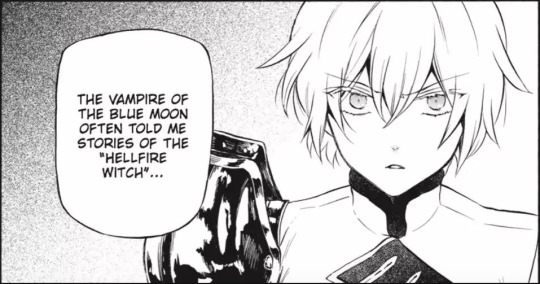
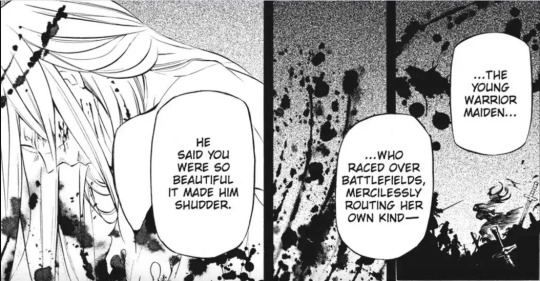
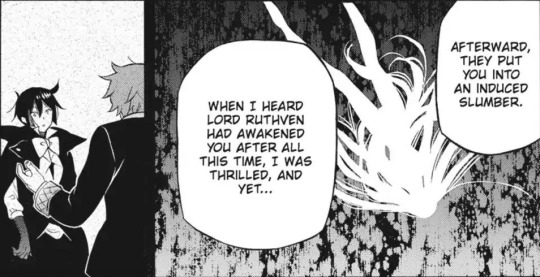
A dump for all my questions and theories about Jeanne. In the manga, the third chapter is named after her (Chapter 1 is Vanitas, while Chapter 2 is Noe). Arguably, you could say she’s the third most important character. Among all of the main characters, her past seems to be the one we know least about. This actually ties to my questions relating to vampires and their ages.
I am a bit confused about how aging works with vampires and how that reflects physically. We have Noe and Dominique who are chronologically the same age as Vanitas. Assuming nothing goes wrong, human Vanitas would die of old age (except we know that isn’t the case), while Noe and Dominique would look physically the same how many years later. Jeanne’s age wasn’t intentionally revealed because I think it ties in with the plot, but we know she’s centuries older than the main cast. She’s been with Ruthven since before the betrayal, and grew up with Chloe. This is where it gets confusing for me. Chloe became a vampire at four, but physically stopped aging at eleven years old. Jean Jaques was also a hidden vampire changed by Babel but he ended up growing and looking older than Chloe (at least physically). Same with Jeanne. She and Chloe met when Jeanne was younger than her, but Jeanne grew up to look like a young woman. I’m curious as to the difference as to why it was only Chloe who stopped growing physically at around eleven years old, although she’s older than Ruthven.
Jeanne’s link to Luna of the Blue Moon
I don’t think the line above is a throw-away line. Jeanne was of Ruthven’s time, and we find out that Luna had also seen her, specifically during the time of the Great War. She left that big of an impact on Luna that they would retell the story to Vanitas (and I presume Mikhail too), which had that much of impact on him as well.
They removed this context from the anime which makes it as if Vanitas heard of Jeanne through stories, except we know from the manga that it was more personal since he heard it from Luna.
Why exactly did Luna have admiration towards Jeanne? Was it because she was slaughtering Vampires of the Red Moon? But contrary to the rumors, recent chapters would show us that Luna didn’t seem to be a vengeful entity or hold ill-will toward Vampires of the Red Moon.
Luna was also probably the reason why Vanitas felt an initial connection with Jeanne. Like with his hourglass earring, the name, the book, the gloves, etc., despite their complicated past, Vanitas seems to be (consciously or unconsciously) maintaining a link with Luna.
Jeanne’s Slumber (possible connections with Sleeping Beauty)
Why was it necessary for Jeanne to sleep all this time? And why did she have to wake up now, at this exact moment in time? What exact thing does Ruthven need to use her for, and for what purpose? Because let’s admit it, Lord Ruthven is shady af.
It’s also ironic how Jeanne reads Sleeping Beauty and places Vanitas in the princess’ position, when she has more in common with the fairytale. Having to sleep for a hundred years, her mark is that of a rose with thorns evoking the imagery of ‘Briar Rose’ and the spindle, while her epithet ‘Hellfire Witch’ evokes imagery of the evil fairy who could turn into a dragon and breathe fire (admittedly I may be focusing on the Disney version too much).
We know she’s named after Jeanne d’Arc, a martyr who was burnt at the stake (please, please, let this not be foreshadowing of how she dies) hence the connection to her epithet ‘Hellfire Witch’, but even disregarding how vampires (and perhaps humans as well?) have true names, Vanitas says she was ‘bestowed’ a saintly name. We know she was adopted, and we don’t know the circumstances of her birth which are shrouded in mystery, but could Ruthven have been the one to grant the name ‘Jeanne’ to her?
If not for the fact that we already had Florifel and Eglantine in the first chapter, I would have thought Jeanne’s true name and malnomen if she gets one later would be connected to the fairy tale of Sleeping Beauty.
Jeanne’s Malady
The vampires in Vanitas no Carte are different from the stereotypical portrayals of vampires, except for one - Jeanne. Jeanne has that uncontrollable desire to drink blood, and yet as of now, doesn’t appear to be a curse bearer. Based on her patchy memories, we can infer it was Ruthven who made her like this, is the one to supply her with her sketchy medicine, all the while forcing her to swear not to talk about it.
Is she in the same predicament as Loki, Luca’s older brother, forced to have the symptoms of a curse bearer and yet being prevented from being cured, by Ruthven? For what greater purpose? Why is it necessary for Loki to be a curse bearer? And more intriguing than that, why is he consenting to it? It all relates to the Queen somehow, something which no one is privy to except the Oriflamme Family.
Sleeping Lions
Who could Marquis Machina be referring to? Everyone in the Oriflamme family, and by extension Jeanne, have connections with the imagery of lions and fire (they seem to have an elemental affinity like how Luca displayed, except that Ruthven’s is black fire, which makes me wonder what color Loki’s flames would be if ever). Jeanne can’t seem to manipulate the World Formula like Ruthven and Veronica though. The flames come out of her gauntlet, Carpe Diem.
In relation to that, I think Misha’s patron is Marquis Machina. In the same way, Marquis Machina built Carpe Diem for Jeanne, I think he built Misha’s hand and dog for him. I mean Marquis Machina doesn’t seem to be working with Ruthven and Charlatan. His pieces seem to be the kin of the Blue Moon (Vanitas and Misha), the dhams, and the De Sade family. It could also be that the De Sade have their own agenda and are just using Marquis Machina or it’s just a mutual beneficial arrangement. If so, an eventually power struggle is bound to break out, possibly between the De Sade and the Oriflamme families, and poor Jeanne will be caught in the middle. Where then does the Shapeless One play into this? Perhaps a third faction? A silent observer? A loyalist to the queen? There’s still too little information to theorize.
Who could the Sleeping Lion Marquis Machina wants to see wake up be?
Jeanne, Faustina, Luna, and Naenia
It could just be a stylistic thing, but the long flowing light colored hair seem to be common among all of them.
In relation to Pandora Hearts and its themes of will and what measure is a person, what if the Jeanne that we know now is just a consciousness inhabiting a body (kind of like Oz and Jack), specifically the queen’s body to be exact. It would certainly be foreshadowing to when she says ‘promise to kill me when I’m no longer myself anymore’.
Alternatively, the current Jeanne we know may just be a vessel or a golem to house the Queen whose body has deteriorated. It certainly would explain why she was treated as a doll even in her earliest memories. ‘Jeanne’ isn’t supposed to exist.
Although it’s a long shot, since Ruthven has connections with Charlatan, and by extension Dr. Moreau, could ‘No. 70′ have been Jeanne? Again like I said, it’s a long shot. I think it’s likelier that No. 70 is a character we haven’t been introduced to yet.
Jeanne’s Parents
This is a Mochizuki work. Of course, there’s got to be something to it. Why exactly did they side with the humans so suddenly in the war? What horrible thing did the vampires do to have over a thousand of their kind turn against them? And yet the way it reads, rather than betray Ruthven, I think Jeanne’s parents along with all of the vampires who were slaughtered were sacrificial pawns. Maybe I’m just really biased against Ruthven, but I think he was the one to lead the rebellion of his students, and like Chloe, although he presents himself to be an ally of the current Vampire Monarchy, perhaps he’s just biding his time to get revenge for his students. In working with Charlatan, it’s vampires who he’s harming.
What greater purpose could he have in wanting to assassinate his own nephew or ally himself with a known vampire extermination unit of the Chasseurs (Gano and his ilk) or in killing so many vampires by having their true names corrupted?
Face to face with Noe, we see in their meeting that Noe says the exact same words Ruthven told Chloe when he was younger. Noe reminds Ruthven of his students, while Ruthven reminds Noe of his teacher. I’m not really sure where I’m going with this, but it seems like the Ruthven of now scorns his past self’s moderate and progressive ideals of vampires and humans living in harmony. He speaks of our side, your side, and Noe having to choose one or the other. And yet all of his collective actions at this point have served not to protect but rather harm vampire kind, which puts him in direct opposition to Vanitas who wants to save vampires.
In relation to Jeanne, there will be a boiling point. She’s loyal to Luca and she’s loyal to Ruthven. She’s incredibly fond of Dominique. As of now, she also loves Vanitas. And yet down the line, inevitably Luca and Ruthven will be on opposing sides, so I am curious to see how the betrayals and conflicting loyalties will play out.
#vanitas#vanitas no carte#vanitas theories#vnc#vnc jeanne#jeanne the hellfire witch#vanijeanne#sort of domijeanne too maybe#noe archiviste#ruthven oriflamme#lucius oriflamme#dominique de sade#loki oriflamme#so many thoughts#and I'm so excited to see how everything plays out#we're just scratching the surface of vanitas' personal history#but I'm excited to see how everything ties together and the political intrigue#as of now the character I'm most interested about is loki#vnc spoilers#vanitas no carte spoilers#so may questions about jeanne#ramblings about vnc
210 notes
·
View notes
Text
I got a couple asks about my reply to an ask where I said that I acknowledge cop propaganda in procedural’s, and believe that everyone falls for it, while still acknowledging that I have enjoyed those shows. More than one ask said they are fully aware of the propaganda and so they can still watch those said shows, this is something I want to expand on because No one is above falling for propaganda.
I have loved and watched cop shows since I was 12, and I also have studied propaganda academically for half a decade, and that is why I can say with certainty you have internalized and fallen for propaganda within cop shows.
It is important to note that cop shows are designed with the aid of professional police for this exact purpose, they are insanely important to the normalization of behaviours of police, and justifying their actions, because you as an audience emotionally connect with the characters.
There are many things that have circulated around tumblr that have acknowledged certain forms of propaganda - the continuous use of violence, in a way that claims that the police must in many cases resort to violence, Trevor Noah did a great small clip showing how many cop shows do this. On top of that the villainization of internal affairs and the entire defence system, claiming public defenders are moronic and don’t defend their clients well, which in turn makes people afraid to turn to public defenders, which in turn results in people not asking for a lawyer, and at the same time paint defence attorneys as evil as well, and an impediment to justice which makes people dislike lawyers in general.
These are all important functions of the propaganda system as it justifies many actions of cops, but there are so many layers of propaganda, with hundreds of cop shows, all with police consultants, all employing underhanded tactics and specific messaging impacts you, below is a small list of things I either personally have internalized or know people have internalized. In brackets I mention just a couple shows I have seen this on, keep in mind many shows do this and they all tend to overlap
1. We as a society all agree that murder is wrong, but how many times in a cop show have you rooted for the police to get away with murder? How many times has the protagonist killed someone for personal reasons? They may find a way to kill said individual in the line of duty and that is legal, and or in many cases personally hunt them down and commit murder, and then the story line is about them getting away with murder, but at the same time many story lines in the same series say no one has a justifiable reason for murder, and they may even arrest someone for the same reason as they killed someone.
This teaches the audience that you can’t kill for abuse, country, cause, or revenge, but the police can and should kill, and if they do kill it was only for a valid reason
(NCIS, NCIS LA, The Mentalist)
2. The ‘red tape’ and intense scrutiny of police shootings is the worst, and harmful for the police, in general the scrutiny of all of the measures meant to prevent police violence and harassment of citizens is hindering the police. How many shows have you watched where the main character scoffs at the idea of mandatory counselling post a shooting, or is angry by the idea of having to justify why they took a shot and killed a man
(Rookie Blue, Cold Case, Hawaii 5-0)
3. The police are underpaid and lack the funds for the necessary policing measures. This one in particular I internalized to the extreme, I have always held the false assumption that police are underfunded like all of the other services they equate themselves too - but the police departments have more than enough funds as the protests have revealed. Yet, every cop show depicts a scene of complaining about budget cuts, lack of funds, cannot pursue a case because of budget cuts. On top of that any cop that gets caught stealing is justified because if he was paid fairly, he wouldn’t have to do that.
(Castle, Lucifer, Brooklyn Nine Nine)
4. The police can’t save ‘everyone’ in the context of the most vulnerable of society drug addicts, sex workers, the mentality ill, the sad reality is that some people ‘don’t want help’ - it says societal problems are unsolvable not that the police are not qualified or effective in solving society problems but even then there is a plucky do good cop not yet jaded that will try and try to save people, but eventually have to come to a hard realization you can’t save everyone
(Perception, Criminal Minds, Law and Order SVU)
5. The police always work with experts in the field, have the best technology and moreover, experts will want to work tirelessly for the police or the police themselves are geniuses- this is not the case, in fact in many cases police incompetence and ignoring experts leads to false convictions
(Bones, Rizzoli & Isles, all the CSI, Criminal Minds)
But the most malicious form of propaganda is the way in which police procedurals acknowledge the real world political climate and use the criticism as a way to bolster the police, by this I mean, so many cop shows will have an episode of focusing on a corrupt cop, or a civil rights activist wrongfully arrested, wrongful conviction in general, and the narrative will show outrage throughout the system, cops all banning together to undo this injustice, but with enough resistance from some bad apples to make it seem as if they acknowledge the system is not fully functional but reinforces to the audience that many cops can and do fight the system to get the wrongfully accused out of prison, to protect civil liberties and that cops do care and will willingly fight their own to do it .
Moreover, this is shown in the context of the importance of police brotherhood. Being a cop is always more than a job it’s a lifestyle, you can’t stop being a cop, and it’s a part of your identity, so its extra heroic that the protagonist challenged the corrupt cop, it’s as if he or she turned on his own family to do what is right.
There are always episodes about going after the rich and politically connected and how no matter what the protagonist will do what’s right and fight against the system to get justice for a poor, or poc , or down on their luck victim, it teaches us that even though in the news cops might not be able to stop all of the big evil rich people, Kate Beckett or Jake Peralta is out their fighting the fight, trying to take on corporations, it teaches us to go on faith that the police are separate from the corrupt system, and will try to take on politicians and corporations rather than the reality of them working for those same people
Finally, so many cop shows have minorities and women leading the charge to challenge the old guard, usually with the new era of white men, that laugh at the police brutality and incompetence of older generations. It’s hard to ignore the damage the police have done, but every show simply disregards this with a change in the vanguard, newer cops are immune to racism, classicism and agree older cops used to break the rules and where more corrupt but now that isn’t the case. It’s meant to undermine all of the arguments against police, think about how many people agree that the police during the civil rights movement of the 1960s were bad, or the police that co-operated with drug dealers were terrible but no more, cops now are much more ethical.
Propaganda is dangerous, because it is continuous and repetitive, it is subtle and seeps into your life, you internalize things because we all consume media for enjoyment not to subject it to academic rigour, and that's how they get you to sympathize and feel for cops, we constantly watch stories of brave souls putting their lives on the line for us, and of course we want to believe that this is a real life story and reflective of most cops, but we need to realize now that this is not the case in reality, and its not just a few bad apples, but a system that is broken beyond repair, who relied on the entertainment industry to spread and maintain the false face of the police industry to avoid and undermine criticism.
Just remember No one is above falling for propaganda
4K notes
·
View notes
Note
killshot anon! YEAH i totally agree w/ your view on kaeya. it's so weird to me that people will blame him for his role in a situation he was forced into as a child through no choice of his own. that itself had to be traumatic, not to mention everything that happened later. i hate when people say he's untrustworthy - like yeah, he's lied, so has everyone? it's clear he does it mostly to protect himself. not to mention that (& sadism) can be symptoms of trauma. kaeya deserves nothing but happiness
take a seat folks it’s time for a “brynn should’ve been an english major” lesson! today we’re gonna learn some literary theory; specifically, we’re gonna apply psychoanalytical trauma theory to kaeya’s backstory and current character. killshot anon i bet you never thought this would result in a whole ass essay.
disclaimer one! you are allowed to dislike kaeya! i am not saying you need to like him or his character, you’re entitled to your opinion and i’m not here to change your mind.
disclaimer two! i am in no way an expert and this is all for fun! this is just my silly little analysis of one of my favorite characters as someone who’s studied literary theory and rhetoric and can also apply personal experience. seriously analysis is like a hobby to me and this is just an excuse for me to ramble about kaeya.
disclaimer three! this contains lots of spoilers! basically for everything we know in-game, general knowledge as well as stuff from his voicelines and character story. don’t read this if you don’t want spoilers.
since this is going to be filled with spoilers and is about to get really long, everything will be under a cut. for those who wanna read my dumb super informal essay: enjoy!
final note: yeah this is over 2000 words long can you tell i like analysis
⭒
let’s start by getting a quick rundown of trauma theory out of the way. to begin, what is “trauma?” in this case, trauma is going to refer to an experience that greatly affects and changes one’s life; attitudes, memories, behaviors, mental state, etc. while not all changes may be bad, per se, the overall effect of trauma is generally a negative one, which is why it’s so significant. literary trauma theory, then, explores these changes and the impact of trauma in literature. it analyzes the psychological and social effects of trauma, explaining what those effects are and why they happen. in the context of a specific character, trauma theory breaks down said character’s behaviors, feelings, and general mentality in relation to their past experiences; trauma theory hopes to explain to others the reasons for why a character may act or feel the way they do, all based upon the character’s experiences, particularly traumatic ones. our character today is the lovely kaeya alberich, with the “literature” being genshin impact. i’ll be referencing kaeya’s wiki page to ensure i get all details correct for his character story and voicelines.
it would be good to review kaeya’s backstory before delving into the actual analysis. though we don’t know much about his life before living in mondstadt, we’re told he was sent as an agent of khaenri’ah. and by “sent,” i mean his biological father abandoned him in a completely unfamiliar land to serve khaenri’ah’s interests and fullfil his mission—what this entirely entails hasn’t been revealed. mondstadt, however, welcomed kaeya “with open arms when they found him.” crepus ragnvindr took him in as his adopted son, with diluc as his adopted brother. kaeya and diluc were “almost like twins,” so close they “[knew] each other’s thoughts and intentions without a word.” he’d began a new life in mondstadt, one surrounded by friends and family that loved him; one that was completely shattered by crepus’s death. kaeya arrived at the scene of the disaster, and was led to believe diluc was the one who killed their father to “set his father free” from the effects of his delusion. there’d always been one big question in kaeya’s life: if it came down to it, who would he support? the nation that abandoned him, but he still felt loyal to, or the nation and family that took him in and really loved him? overrun with guilt, kaeya confessed his purpose to diluc, sparking a fight between the two brothers. in this fight, kaeya receives his cryo vision. though both brothers stepped away alive, they’ve never been able to make peace with one another. now, kaeya is the eccentric and charming cavalry captain of the knights of favonius; a man who gets his way by using any means necessary, regardless of whether or not it seems right.
kaeya’s not evil; he’s morally ambiguous, and that stems from what appears to be a general distrust of others. his life is one shrouded in secrecy. from the moment he stepped foot into mondstadt, he was surrounded by secrets. even now, he doesn’t talk about a lot of things, namely his past, vision, and feelings. though he’s always willing to get information out of others, kaeya never reveals anything about himself. he repeatedly tells the player they can confide in him, but whenever you try and pry into his life, he deflects your questions with some sort of witty comment or flirty remark. anything he does reveal is vague, or spoken in some sort of “code.” for example, his “interesting things” voiceline. he tells us about the owl of dragonspine, how it “seems to look right through you, while letting go of none of its own secrets,” and then tacks on a “quite fascinating, don’t you think?” it seems like an awfully accurate parallel to himself; kaeya does all he can to get information from others, but never gives anything about himself. now, this whole thing—his relationship with diluc falling apart and his need for secrecy—could have probably been avoided if he had just come clean about his mission years ago. so why didn’t he? to start, kaeya was a literal child. not only are children unable to properly tell the difference between right and wrong, but they’ll also typically follow their parents’ orders blindly. kaeya had just been abandoned, and he wouldn’t want to risk being cast out by mondstadt as well if he came clean right away. you see, there’s this thing about trauma, something that trauma theory states. traumatized people feel a sort of shame or guilt regarding their traumatic experience; they’ll keep quiet because they don’t want to cause problems or bother others with their issues. of course kaeya wouldn’t tell the truth about his past, he doesn’t want to destroy the genuinely loving relationships he’d built in mondstadt. his fight with diluc only proves what he was afraid of: if he’s honest, he’ll be abandoned again. and if kaeya’s used to all the lies, why should he bother changing?
another thing, if he’s not going to tell the truth, then why would he have initially gone along with his father’s plans? again, he was a child. he really had no choice, and was forced into a very wrong and cruel situation. there’s a good explanation for this, too, which is also stated in trauma theory; traumatized people will still do their best to please their abusers. especially if said abuser is a parent, that will drive traumatized people to work even harder to please them. although his father hurt him by ruthlessly abandoning him, kaeya still sought to make him and his homeland proud. he was willing to be used as a tool for their gain; that is, until he found people who actually cared about him. he was an impressionable child, of course he’s going to obey orders. but as he gets older, he feels torn. does he serve those who abandoned him, or those that took him in? his father—and arguably, khaenri’ah as a whole—hurt him, sure, but he still feels some loyalty and connection to his former home. instead of revealing anything, he lets the situation play out. that way, he can’t be blamed when things fall apart.
the thing about claiming he’s untrustworthy is that hardly anyone in-game believes that. he’s adored by the older folks in mondstadt, and foes and allies alike find him easy to talk to. despite seeming lazy and uninterested in work, kaeya takes his job very seriously. in fact, his story states that crepus’s death was the “first and only time kaeya failed in his duty.” the “only time” is especially important, because it signifies kaeya still fulfills his duties successfully. he’s had a total of one slip-up, and hasn’t failed since. no, kaeya is not untrustworthy. rather, kaeya finds everyone else untrustworthy. it’s not unlikely that this is a direct consequence of being abandoned as a child. although it’s been established that kaeya and diluc were very close as children, when crepus dies, kaeya assumes diluc is the one that killed him. in order to jump to such an extreme conclusion against someone he was so close to, there had to be some underlying sense of distrust. furthermore, kaeya expresses feeling as though he doesn’t belong anywhere. he was abandoned by khaenri’ah, and then worried he wouldn’t be accepted by mondstadt. he is, but there’s still that worry. if you place him in your teapot as a companion, he tells you that your home feels like someplace he belongs, following it up with a “heh, who’d have thought…” kaeya still feels as though he doesn’t belong in mondstadt; despite the fact that he’s a high-ranking knight of favonius and rather popular, he still feels like an outsider. he doesn’t trust that anyone actually wants him around, and he finds joy in testing peoples’ trustworthiness. it’s noted in his story and through his voicelines that the beloved cavalry captain has a rather sadistic nature. he likes putting people into difficult situations, to see what decisions they will make. he does this to both opponents and allies, testing to see who’s going to back out and who’ll keep fighting; in the sake of allies, who can he trust? or who will turn tail and abandon their teammates at the slightest hint of danger? i mentioned it previously, but kaeya doesn’t care what measures he has to take so long as his job gets done and he gets the answers he wants. it’s a sort of self-preserving mindset, putting himself above the safety of others. kaeya’s trying to protect himself, which makes sense with all he’s been through. he doesn’t want to be hurt, and instead finds pleasure in threatening harm upon others. it’s twisted, sure, but it’s because he can only trust himself in a world that he believes is out to get him. he’s got as many enemies—if not more—as he does allies; of course kaeya focuses on protecting himself first, whether physically or through keeping his secrets, well, secret.
his most obvious traumatic effect is definitely his alcoholism. but he uses it as a distraction, not just to wallow in self-pity. this is seen again in his story, particularly in story 3. it’s found that when his favorite drink, death after noon, is out of season, mondstadt’s crime rate is decreased drastically. at face value, this just means kaeya spends more time working when death after noon is low in supply. but kaeya doesn’t skip work to go to taverns; it’s already been established he takes his job very seriously, so this means he actually patrols and tracks down threats while off work when he can’t indulge in his favorite alcoholic drink. he doesn’t get drunk simply because he’s depressed. if he did, there wouldn’t be a drop in incidents when death after noon is out of season. no, kaeya uses both the alcohol and fighting to distract himself. after all, it’s a little hard to think about feeling sad when you’re either drunk out of your mind or fighting for your life.
despite being so secretive, kaeya gives us glimpses of his true emotions from time to time. as previously mentioned, his flirty attitude is nothing more than a mask to hide how he really feels; and kaeya is terribly, terribly lonely. that may be why he seems so extroverted. constantly being around people should, logically, drive away that feeling, but it doesn’t work like that. when he talks with the player, he frequently expresses disappointment when you have to leave. each time, though, he dampens the weight of his words with playful or flirty language. he’s lonely, but doesn’t want you to know that, like he’s afraid of asking you to stay. he takes the seriousness of his feelings, and basically bends it into some sort of lighthearted joke. kaeya hides his true feelings—negative feelings, to be exact—so that he doesn’t bother anyone. which is, again, something that happens with traumatized people. he displays that hesitance to reveal his true feelings, because there’s a shame or guilt that comes with his past. he doesn’t want to bother others or hold them back, so he puts on a smile and amps up the charisma. one other very important thing—but very small detail—i would like to note is his feelings toward family. his fell apart not even once, but twice, and kaeya still holds familial relationships in high regard. we know he doesn’t exactly care how he goes about getting his work done. he doesn’t pay attention to what’s “right” or “wrong,” so long as he gets what he needs. but one of his informants, vile, notes that the cavalry captain has one exception: he won’t work with those who threaten others’ families. in fact, kaeya claims those who do should be hunted down and destroyed. even though his own families have caused him so much pain—and he ended up estranged from both—he still understands the importance of having people who love you in your life. because he didn’t get that.
kaeya’s not evil. ultimately, as a knight of favonius, his goal is to protect others, because no one was there to protect him. and because no one was there to protect him, because he’s been hurt time and time again by people who were supposed to love him, kaeya has taken to protecting himself. he hides any and all negative feelings with a charismatic, friendly façade, because he thinks it’ll drive away his persistent loneliness. any “bad” actions of his were hardly his fault; he was forced into a life of secrecy and lies, and then abandoned by the first people who truly loved him. kaeya’s a multi-faceted, tragic character, one that toes the line between good and evil, and that’s what makes him so interesting.
#brynn yells#brynn answers#killshot anon#brynn's writing#genshin#genshin impact#kaeya#kaeya alberich#genshin kaeya
226 notes
·
View notes
Note
These are questions I've had for some while and it's hard to find someone who'll answer with grace. This mostly relates to disabilities (mental or physical) in fiction.
1) What makes a portrayal of a disability that's harming the character in question ableist?
2) Is there a way to write a disabled villain in a way that isn't ableist?
In the circles I've been in, the common conceptions are you can't use a character's disability as a plot point or showcase it being a hindrance in some manner. heaven forbid you make your villain disabled in some capacity, that's a freaking death sentence to a creative's image. I understand historically villains were the only characters given disabilities, but (and this is my personal experience) I've not seen as many disabled villains nowadays, heck, I see more disabled heroes in media nowadays.
Sorry if this comes off as abrasive, I'd really like to be informed for future media consumption and my own creative endeavors.
Okay so the first thing I'm going to say is that while it IS a good idea to talk to disabled people and get their feedback, disabled people are not a monolith and they aren't going to all have the same take on how this goes.
My personal take is biased in favor that I'm a neurodivergent person (ADHD and autism) who has no real experience with physical disabilities, so I won't speak for physically disabled people- heck, I won't even speak for every neurotype. Like I say, people aren't a monolith.
For myself and my own writing of disabled characters, here's a couple of concepts I stick by:
Research is your friend
Think about broad conventions of ableism
Be mindful of cast composition
1. Research is your friend
Yeah this is the thing everybody says, so here's the main bases I try to cover:
What's the story on this character's disability?
Less in terms of 'tragic angst' and more, what kind of condition this is- because a congenital amputee (that is to say, someone who was born without a limb) will have a different relationship to said limb absence than someone who lost their limb years ago to someone who lost their limb yesterday. How did people in their life respond to it, and how did they respond to it? These responses are not "natural" and will not be the same to every person with every worldview. This can also be a great environment to do worldbuilding in!
Think about the movie (and the tv series) How To Train Your Dragon. The vikings in that setting don't have access to modern medicine, and they're, well, literally fighting dragons and other vikings. The instance of disability is high, and the medical terminology to talk about said disabilities is fairly lackluster- but in a context where you need every man you possibly can to avoid the winter, the mindset is going to be not necessarily very correct, but egalitarian. You live in a village of twenty people and know a guy who took a nasty blow to the head and hasn't quite been the same ever since? "Traumatic Brain Injury" is probably not going to be on your lips, but you're also probably going to just make whatever peace you need to and figure out how to accommodate Old Byron for his occasional inability to find the right word, stammers and trembles. In this example, there are several relevant pieces of information- what the character's disability is (aphasia), how they got it (brain injury), and the culture and climate around it (every man has to work, and we can't make more men or throw them away very easily, so, how can we make sure this person can work even if we don't know what's wrong with them)
And that dovetails into:
What's the real history, and modern understandings, of this?
This is where "knowing the story" helps a lot. To keep positing our hypothetical viking with a brain injury, I can look into brain injuries, what affects their extent and prognosis, and maybe even beliefs about this from the time period and setting I'm thinking of (because people have had brains, and brain injuries, the entire time!) Sure, if the setting is fantastical, I have wiggle room, but looking at inspirations might give me a guide post.
Having a name for your disorder also lets you look for posts made by specific people who live with the condition talking about their lives. This is super, super important for conditions stereotyped as really scary, like schizophrenia or narcissistic personality disorder. Even if you already know "schizophrenic people are real and normal" it's still a good thing to wake yourself up and connect with others.
2. Think about broad conventions of ableism
It CAN seem very daunting or intimidating to stay ahead of every single possible condition that could affect someone's body and mind and the specific stereotypes to avoid- there's a lot under the vast umbrella of human experience and we're learning more all the time! A good hallmark is, ableism has a few broad tendencies, and when you see those tendencies rear their head, in your own thinking or in accounts you read by others, it's good to put your skeptical glasses on and look closer. Here's a few that I tend to watch out for:
Failing the “heartwarming dog” test
This was a piece of sage wisdom that passed my eyeballs, became accepted as sage wisdom, and my brain magnificently failed to recall where I saw it. Basically, if you could replace your disabled character with a lovable pet who might need a procedure to save them, and it wouldn’t change the plot, that’s something to look into.
Disability activists speak often about infantilization, and this is a big thing of what they mean- a lot of casual ableism considers disabled people as basically belonging to, or being a burden onto, the able-bodied and neurotypical. This doesn’t necessarily even need to have an able neurotypical in the picture- a personal experience I had that was extremely hurtful was at a point in high school, I decided to do some research on autism for a school project. As an autistic teenager looking up resources online, I was very upset to realize that every single resource I accessed at the time presumed it was talking to a neurotypical parent about their helpless autistic child. I was looking for resources to myself, yet made to feel like I was the subject in a conversation.
Likewise, many wheelchair users have relayed the experience of, when they, in their chair, are in an environment accompanied by someone else who isn’t using a chair, strangers would speak to the standing person exclusively, avoiding addressing the chair user.
It’s important to always remind yourself that at no point do disabled people stop being people. Yes, even people who have facial deformities; yes, even people who need help using the bathroom; yes, even people who drool; yes, even people whose conditions impact their ability to communicate, yes, even people with cognitive disabilities. They are people, they deserve dignity, and they are not “a child trapped in a 27-year-old body”- a disabled adult is still an adult. All of the “trying to learn the right rules” in the world won’t save you if you keep an underlying fear of non-normative bodies and minds.
This also has a modest overlap between disability and sexuality in particular. I am an autistic grayromantic ace. Absolutely none of my choices or inclinations about sex are because I’m too naive or innocent or childlike to comprehend the notion- disabled people have as diverse a relationship with sexuality as any other. That underlying fear- as mentioned before- can prevent many people from imagining that, say, a wheelchair user might enjoy sex and have experience with it. Make sure all of your disabled characters have full internal worlds.
Poor sickly little Tiffany and the Red Right Hand
A big part of fictional ableism is that it separates the disabled into two categories. Anybody who’s used TVTropes would recognize the latter term I used here. But to keep it brief:
Poor, sickly little Tiffany is cute. Vulnerable. How her disability affects her life is that it constantly creates a pall of suffering that she lives beneath. After all, having a non-normative mind or body must be an endless cavalcade of suffering and tragedy, right? People who are disabled clearly spend their every waking moment affected by, and upset, that they aren’t normal!
The answer is... No, actually. Cut the sad violin; even people who have chronic pain who are literally experiencing pain a lot more than the rest of us are still fully capable of living complex lives and being happy. If nothing else, it would be literally boring to feel nothing but awful, and people with major depression or other problems still, also, have complicated experiences. And yes, some of it’s not great. You don’t have to present every disability as disingenuously a joy to have. But make a point that they own these things. It is a very different feeling to have a concerned father looking through the window at his angel-faced daughter rocking sadly in her wheelchair while she stares longingly out the window, compared to a character waking up at midnight because they have to go do something and frustratedly hauling their body out of their bed into their chair to get going.
Poor Sickly Little Tiffany (PSLT, if you will) virtually always are young, and they virtually always are bound to the problems listed under ‘failing the heartwarming dog’ test. Yes, disabled kids exist, but the point I’m making here is that in the duality of the most widely accepted disabled characters, PSLT embodies the nadir of the Victim, who is so pure, so saintly, so gracious, that it can only be a cruel quirk of fate that she’s suffering. After all, it’s not as if disabled people have the same dignity that any neurotypical and able-bodied person has, where they can be an asshole and still expect other people to not seriously attack their quality of life- it’s a “service” for the neurotypical and able-bodied to “humor” them.
(this is a bad way to think. Either human lives matter or they don’t. There is no “wretched half-experience” here- if you wouldn’t bodily grab and yank around a person standing on their own feet, you have no business grabbing another person’s wheelchair)
On the opposite end- and relevant to your question- is the Red Right Hand. The Red Right Hand does not have PSLT’s innocence or “purity”- is the opposite extreme. The Red Right Hand is virtually always visually deformed, and framed as threatening for their visual deformity. To pick on a movie I like a fair amount, think about how in Captain America: The Winter Soldier, the title character is described- “Strong. Fast. Had a metal arm.” That’s a subtle example, but, think about how that metal arm is menacing. Sure, it’s a high tech weapon in a superhero genre- but who has the metal arm? The Winter Soldier, who is, while a tormented figure that ultimately becomes more heroic- scary. Aggressive. Out for blood.
The man who walks at midnight with a Red Right Hand is a signal to us that his character is foul because of the twisting of his body. A good person, we are led to believe, would not be so- or a good person would be ashamed of their deformity and work to hide it. The Red Right Hand is not merely “an evil disabled person”- they are a disabled person whose disability is depicted as symptomatic of their evil, twisted nature, and when you pair this trope with PSLT, it sends a message: “stay in your place, disabled people. Be sad, be consumable, and let us push you around and decide what to do with you. If you get uppity, if you have ideas, if you stand up to us, then the thing that made you a helpless little victim will suddenly make you a horrible monster, and justify us handling you with inhumanity.”
As someone who is a BIG fan of eldritch horror and many forms of unsettling “wrongness” it is extremely important to watch out for the Red Right Hand. Be careful how you talk about Villainous Disability- there is no connection between disability and morality. People will be good, bad, or simply just people entirely separate from their status of ability or disability. It’s just as ableist to depict every disabled person as an innocent good soul as it is to exclusively deal in grim and ghastly monsters.
Don’t justify disabilities and don’t destroy them.
Superpowers are cool. Characters can and IMO should have superpowers, as long as you’re writing a genre when they’re there.
BUT.
It’s important to remember that there is no justification for disabilities, because they don’t need one. Disability is simply a feature characters have. You do not need to go “they’re blind, BUT they can see the future”
This is admittedly shaky, and people can argue either way; the Blind Seer is a very pronounced mythological figure and an interesting philosophical point about what truly matters in the world. There’s a reason it exists as a conceit. But if every blind character is blind in a way that completely negates that disability or makes it meaningless- this sucks. People have been blind since the dawn of time. And people will always accommodate their disabilities in different ways. Even if the technology exists to fix some forms of blindness, there are people who will have “fixable” blindness and refuse to treat it. There will be individuals born blind who have no meaningful desire to modify this. And there are some people whose condition will be inoperable even if it “shouldn’t” be.
You don’t need to make your disabled characters excessively cool, or give them a means by which the audience can totally forget they’re disabled. Again, this is a place where strong worldbuilding is your buddy- a handwave of “x technology fixed all disabilities”, in my opinion, will never come off good. If, instead, however, you throw out a careless detail that the cool girl the main character is chatting up in a cyberpunk bar has an obvious spinal modification, and feature other characters with prosthetics and without- I will like your work a lot, actually. Even if you’re handing out a fictional “cure”- show the seams. Make it have drawbacks and pros and cons. A great example of this is in the series Full Metal Alchemist- the main character has two prosthetic limbs, and not only do these limbs come with problems, some mundane (he has phantom limb pains, and has to deal with outgrowing his prostheses or damaging them in combat) some more fantastical (these artificial limbs are connected to his nerves to function fluidly- which means that they get surgically installed with no anesthesia and hurt like fuck plugging in- and they require master engineering to stay in shape). We explicitly see a scene of the experts responsible for said limbs talking to a man who uses an ordinary prosthetic leg, despite the advantages of an automail limb, because these drawbacks are daunting to him and he is happier with a simple prosthetic leg.
Even in mundane accommodations you didn’t make up- no two wheelchair users use their chair the exact same way, and there’s a huge diversity of chairs. Someone might be legally blind but still navigate confidently on their own; they might use a guide dog, or they might use a cane. They might even change their needs from situation to situation!
Disability accommodations are part of life
This ties in heavily to the previous point, but seriously! Don’t just look up one model of cane and superimpose it with no modifications onto your character- think about what their lifestyle is, and what kind of person they are!
Also medication is not the devil. Yes, medical abuse is real and tragic and the medication is not magic fairy dust that solves all problems either. But also, it’s straight ableism to act like anybody needing pills for any reason is a scary edgy plot twist.
(and addiction is a disease. Please be careful, and moreover be compassionate, if you’re writing a character who’s an addict)
3. Be mindful of cast composition
This, to me, is a big tip about disability writing and it’s also super easy to implement!
Just make sure your cast has a lot of meaningful disabled characters in it!
Have you done all the work you can to try and dodge the Red Right Hand but you’re still worried your disabled villain is a bad look? They sure won’t look like a commentary on disability if three other people in the cast are disabled and don’t have the same outlook or role! Worried that you’re PSLT-ing your main character’s disabled child? Maybe the disability is hereditary and they got it from the main character!
The more disabled characters you have, the more it will challenge you to think about what their individual relationship is with the world and the less you’ll rely on hackneyed tropes. At least, ideally.
-
Ultimately, there’s no perfect silver bullet of diversity writing that will prevent a work from EVER being ableist, but I hope this helped, at least!
190 notes
·
View notes
Text
I haven’t been in the star trek fandom for very long (I’ve only just started binging the series in the last couple months), so it’s been pretty surprising to find out just how negative the perception of the reboot movies are.
this isn’t coming from the perspective of someone who grew up with the series, so it hit different for me than it might for people with a different relationship to TOS, but I thought it was genuinely clever and Respectful with how it was handled.
To quote leonard nimoy: “Well the alternative timeline gives them license to escape from canon concerns. I can’t see people saying ‘they shouldn’t do that because…’ or ‘that doesn’t tie in to such and such’ because it is a different time and place. Am I right about that?”
[Link]
the entire Premise is that the original series happened as it was presented in TOS, but an event late in Spock’s life caused the creation of a parallel universe in which everyone’s lives were significantly altered through two key changes to the timeline. this gives them the freedom to Both revel in fanservice And explore different facets of the characters and their relationships.
the destruction of vulcan Vastly impacts the characters and the plot moving forward, and its a detail that a lot of people take issue with. but the emotional impact of sarek admitting Directly to spock that there is value in his humanity, that his feelings Aren’t wrong, that sarek married amanda because he Loved her cannot be understated. you can read all of these things into sarek as he was in the original series, but he Never had an open conversation about these things with spock. this creates a Believable and Rewarding change in their relationship, where we get to see a different facet of them Because of the changes made. and that’s exactly the appeal. showing us pieces of these characters that we never got in TOS that are nevertheless undeniably Them.
everyone is Different yes, but they’re also fundamentally the same people at their core and that matters.
kirk’s personality obviously takes the biggest change, with him experiencing trauma at a young age, losing his father, and having an implied abusive father figure after that point. he has a harsher personality in reaction to harsher conditions, he’s spikier and harder to love. but he’s also still fundamentally a Good person whose willing to risk everything to help people. he still has what made kirk prime a good captain and a good friend.
I’m not gonna say that it’s the most nuanced story in the world, but it explores a version of kirk that was born from even Less fortunate circumstances than kirk prime, exploring a kirk brimming with potential who learned to bite back after he was kicked down. exploring those themes of trauma and loss, of insecurity and growth, and coming to the conclusion that Fundamentally He Is Capable Of Good isn’t a Bad thing. you don’t have to like it, but his growth into a better person is The Point. they deepened his flaws (all of which were present in a less exaggerated form in TOS) To Show That Growth.
and then of course there’s his relationship with spock.
people are totally justified in not liking that they had a rough start to their relationship, I usually don’t like to see that kind of thing in reboots or hollywood adaptations either, but the way people talk about it is just unfair.
Yes kirk and spock and bones have a very strong relationship in TOS, they also already know each other by the time the show starts. to look at them having to learn to get to know and trust each other when they first meet and say that it’s Bad because they were already full on ride or die for each other in the og series is silly. TOS kirk and spock had to meet and fall in love with each other too, it didn’t just happen over night kings.
secondly, the entire point of the first movie is that Even With reality itself being altered to pull them apart they are fundamentally compatible people that are Bound to each other. they meet each other on bad terms because of circumstances outside of their control, and yet they’re still pulled into each other’s orbit and find the other slotting into place next to them as if they always belonged. one of the first things that spock prime says in the movie is “I am and always will be your friend,” spock and jim are Meant for each other and the movie goes out of its way to explain that. which is what makes it so Weird to see people complaining about how they don’t like each other.
it’s a Different relationship, but it’s absolutely no less steeped in yearning or queer subtext.
speaking of queer subtext ! some people are Very unhappy with spock’s relationship with uhura.
first thing I wanna say is that making the argument that they’re doing anything that the original series hasn’t done is just, completely untrue. kirk has fallen in love with more girls in the og series than he knew what to do with, leonard nimoy was a heartthrob in his time (and he deserves it, awooga) and spock reflects that ! Spock usually turns the women who come onto him down (or when he doesn’t it’s because a plant has literally altered his mind), but there are exceptions to even that. all of three of the main boys have plenty of romance subplots, it happens. if that takes the possibility of them being queer off the table for you (which it shouldn’t, m-spec people exist) then I’m sorry to say that TOS is not exempt.
now, I can understand why Specifically This Relationship could rub people the wrong way or being disappointed that they didn’t outright depict kirk and spock as having a relationship (if not in the first movie then in the following ones after they’ve gotten to know each other), but even in that context the way I’ve seen people talk about it comes off as insensitive.
no, the relationship did not come out of nowhere. they considered having spock and uhura date each other in the original show (and you can see signs of this in the earlier episodes, where uhura very obviously flirts with him and they spend time together in their down time) before they decided against it, and spock was originally going to kiss uhura until shatner insisted that he wanted to do it (because it was the first interracial kiss on tv). [Link 1, Link 2, Link 3]
nichelle nichols was asked about this exact thing (spock and uhura’s relationship in the movie), you can read the interview in full here [Link] but I’d like to highlight this paragraph in particular:
“Now, go back to my participation in Star Trek as Uhura and Leonard (Nimoy) as Spock. There was always a connection between Uhura and Spock. It was the early 60’s, so you couldn’t do what you can do now, but if you will remember, Uhura related to Spock. When she saw the captain lost in space out there in her mirror, it was Spock who consoled her when she went screaming out of her room. When Spock needed an expert to help save the ship, you remember that Uhura put something together and related back to him the famous words, “I don’t know if I can do this. I’m afraid.” And Uhura was the only one who could do a spoof on Spock. Remember the song (in “Charlie X”)? Those were the hints, as far as I’m concerned.”
the film makers looked at the fact there were Hints for uhura and spock, that they were Interested in exploring an interracial couple for the first time (both before and immediately after interracial couples won the right to legally get married) but Couldn’t because of the circumstances of the times and decided to Make that depiction. you don’t have to Like their relationship just because of that fact, but it’s Incredibly reductive to play down it’s significance as just a No Homo cop out. explicitly queer relationships are not the only progressive or culturally important relationships in fiction.
moreover, if you can’t imagine polyamory in the communist utopian future that’s on you.
moreover, this perception that this was a soulless cash grab is just, unfounded.
leonard nimoy returned to the role as spock for the first time in 16 years (since 1991) and this was Entirely because of the respect they had for nimoy, spock as a character, and the franchise as a whole.
Lets look at some quotes from nimoy in interviews regarding the film:
Leonard Nimoy: When I first read the script (...) I immediately contacted J.J. and said “I think it is terrific…I think you guys have done a wonderful job. There is still work to be done, but it is very clear that you and your writers know what you are doing and you know how to do this movie and know what it should be about….and I am very interested.” Then as time went by we worked things out with Paramount, but the most important things were J.J. and the script. (...) I am very pleased about that and I am very comfortable with where this is going. I think the writers have done a terrific job. They have a real sense of the characters and the heart of Star Trek and what it is really all about.
(...)
TrekMovie.com: Now in the case of the new movie you have been retired from acting for years. What was it about this one that made you want to act again and go through the make up again? What was it that made you say ‘I really want to do this?’
Leonard Nimoy: You are right, this is a special situation. First it is Star Trek and so I have to pay attention. I owe that to Star Trek. Second place is that it is J.J. Abrams who I think very highly of, he is a very talented guy. Then came the script and it was very clear that I could make a contribution here. The Spock character that I am playing, the original Spock character, is essential and important to the script. So on the basis of those three elements it was easy to make the decision. So those three things: Star Trek, J.J. Abrams, and an interesting Spock role.
[Link]
Praising the cast playing younger versions of characters from the original 1960s TV series, he [Leonard Nimoy] said: “Let me take the opportunity to say this. Everybody at this table [the cast] are very, very talented and intelligent people.”
“They found their own way to bring that talent and intelligence to this movie, and I think it shows. (...) When Karl Urban introduced himself as Leonard McCoy and shook hands with Chris Pine, I burst into tears. That performance of his is so moving, so touching and so powerful as Doctor McCoy, that I think D. Kelley would be smiling, and maybe in tears as well.”
“The makers of this film reawakened the passion in me that I had when we made the original film and series. I was put back in touch with what I cared about and liked about Star Trek, and why I enjoyed being involved with Star Trek. So, it was an easy way to come on home.”
“[In this Star Trek] they said things and showed me things, and demonstrated the sensibility that I felt very comfortable with, and I think that shows in the movie. I like it.”
[Link 1, Link 2]
again, you don’t have to like it just because leonard nimoy did, you don’t have to Agree. but the idea that nobody working on the film Cared is provably false. near everyone working on the project was already a fan of the series or were excited to be involved and did their homework. it’s genuinely a Miracle just how much of a labor of love this was, and in my opinion you can feel that through the movie itself. I’d highly recommend looking into interviews and behind the scenes details about the movies. they had a respect not just for the source material, but for leonard nimoy as a person.
there’s definitely more I Could say about this, but it’s 4 am now so I’m gonna shelve it jklfdsa
that said! it’s Fine to not like the movie, not everything is going to be suited to everyone’s taste, but the specific criticisms I’ve seen feel very off base
#star trek#kirk#spock#uhura#nichelle nichols#leonard nimoy#star trek aos#aos#star trek tos#tos#meta#long post#hello followers I write essays about star trek now
112 notes
·
View notes
Note
I feel like people confuse heroes with what we know here in America as cops lol
What’s so wrong with Hawks killing Twice is that he’s claiming to be a hero. Heroes don’t kill. And people keep comparing them to real life cops who kill when they deem it’s necessary, or whatever.
Now don’t get me wrong I don’t think cops should kill either, but that’s a different discussion. But the bottom line is you can’t call yourself a hero if you can’t find a way to save people without killing someone else, and Hawks is doing just that, and the other “heroes” are allowing it, which in my opinion makes them not *true* heroes.
Why people insist on forcing cop values onto fictional heroes is beyoooond me.
So I got this ask like two months ago (at least; it might’ve been longer) and wrote out a response, but decided not to post it because it is a complex answer. With the diskhorse now revived and rearing its ugly head, I decided to refine a bit of this and post my thoughts.
I don’t think a distinction between cops and heroes is really important, since as far as we have seen in BNHA... we aren’t really sure of the distinction, plus at least for me as an American, I can’t comment on Japan’s system (and there’s a major racism factor in the US).
We have seen heroes willing to kill in the manga (I mean, they were all trying to kill Tomura), though. This fits with this chapter’s (314) indication of a highly corrupt system.
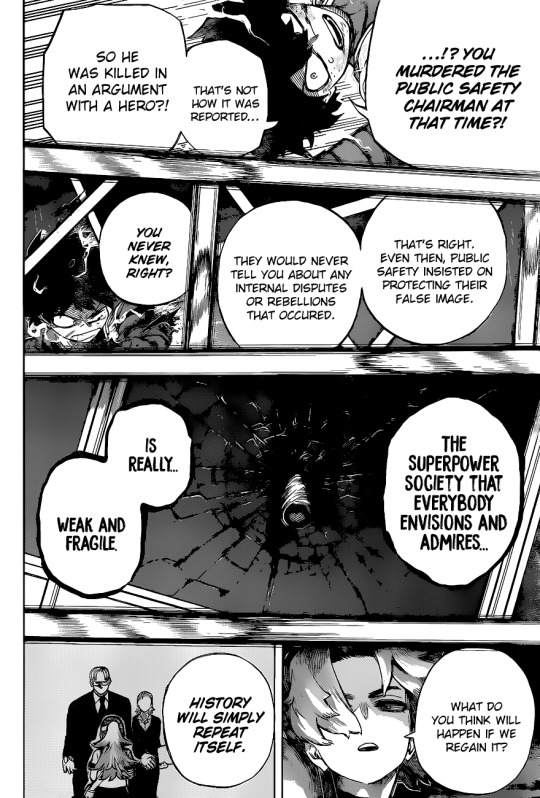
I also completely agree with you: in general (look extreme situations exist, but BNHA thus far isn’t in one; it will likely have one towards the end with AFO) if you can’t find a way to save a life without it coming at the cost of another, that isn’t something heroic to be celebrated, and that’s a cheap-ass view of justice (also as a personal value). It’s a tragedy, not something to be admired or inspired by or to aim for, all of which are generally responses to heroism as a concept (within our world and within BNHA).
This idea--that killing is not heroic--is also reflected in the story for the most part: from chapter one, we are told a hero saves. We can thus conclude that someone who does not save is probably not intended to be seen as heroic in that moment (which is not the same as condemning them as a monster who cannot change). That is clearly a value of the story, so to uphold this, Twice’s death (since this is the scenario wherein this tends to be discussed) has to be wrong, thematically speaking.
On the correlation of cops/heroes... it is complicated.
In general, I think it’s poor analysis to directly correlate fiction (especially when the work is from another culture than one’s own) to real current events, and particularly when they are so raw, real, and painful. At the same time, I also get that it’s impossible for brains not to make connections and see familiar circumstances in them. However, this doesn’t mean that 1=1 but instead is a blurry reflection in a mirror: the arguments and logic are not entirely removed from the real world, even if not intended to be 1=1 equivalents (by equivalents I mean direct representations of a particular real life event/concept). Even if the author does not intend the reflection, it can still exist and be picked up on by readers, or by the fandom in their respective contexts/cultures. This is not “wrong” of fans; we.all do this.
So, to return to how Twice’s death is analyzed within the specific context of fandom, I’m reluctant to equate it to the real world, while at the same time indeed finding it almost impossible not to shiver at the way the arguments used by hero stans mimic rhetoric from the real world. Personally, I do find it disturbing how many people come to my inbox and make the same exact arguments as “blue lives matter” folks. Of course it is fictional and therefore different, but it can trigger things especially given the current events in the US, where I live. I’m unsettled by said argument even with contextual and cultural changes taken into account, because on a “personal value” level, the arguments are just flat invalid, rooted in a very shallow understanding of justice, and prone to the whims of injustice. Additionally, many of the asks I’ve gotten do indeed draw on the real world “well it’s okay for real world cops/soldiers/etc” directly, which is partially why I think I’ve responded heatedly before, and why I think other meta writers have done the same.
That does not mean these fans inherently have a certain point of view (many don’t); I’m just saying that the similarities in arguments specifically around the morality of using lethal force against a potential criminal is hella yikes for me personally, and I know I’m not alone in this (and also know that people closer to these issues than myself might feel differently too; there are no monoliths). Anyways, I wish more hero fans would acknowledge this when justifying Twice’s death. It’s fair to discuss it within the realm of the series’ portrayal of morality, and the story has been odd with the framing around Twice’s death: the narrative hasn’t called Hawks out (yet), while also portraying Hawks unequivocally as in the wrong during the actual murder (look at the panels again. Horikoshi drew them that way for a reason).

But people often revert to real world justice arguments to vindicate Hawks, and... maybe don’t?
Is Hawks brainwashed? To an extent, yes. He’s not more or less culpable than Dabi or Shigaraki just because the law gives him a license to kill. We can discuss ideological motives and how they impact the degree to which a character will be held responsible in a story because, of course, it is not the real world and is for a message, but that’s for another day. He needs a chance to free himself, but you can’t say that he did not do something wrong by killing Twice. That doesn’t make him a monster.
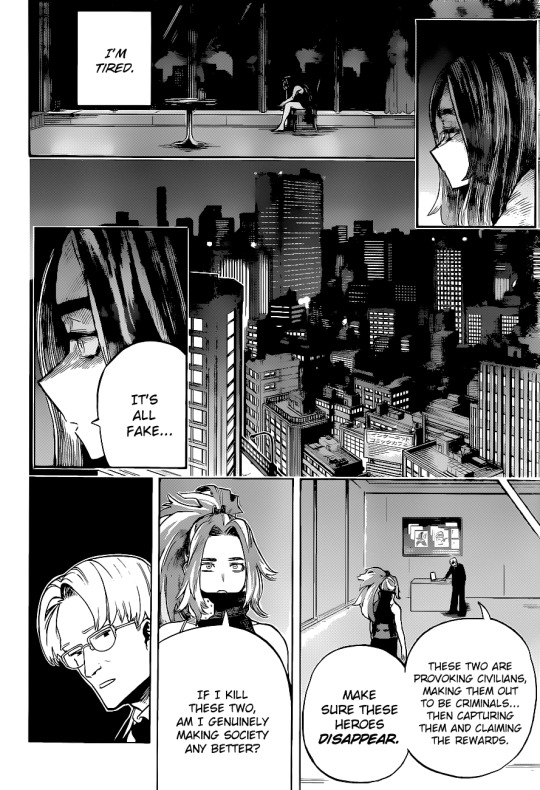
Anyways I think the fandom ought to be more sensitive and self-aware of the arguments we are making, and where they come from.
156 notes
·
View notes
Note
I hope the rumours of Louis being a brothel owner aren't true, but if they are I can sort of see why they're going for this route? I mean, with a black Louis they can't have him being a slaver anymore, so maybe they're trying to find something that is also morally reprehensible for him to be.
TL;DR: My kneejerk reaction was to be saddened, and I don’t like that this is starting up, and will continue to fuel, fandom drama. Ultimately, if we want peace, we’ll embrace the fact that the existence of this adaptation doesn’t take away from the existence of the books, and it also doesn't mean we have to acknowledge it.
It makes me wonder whether AMC wants us to make a storm about this. We’ll see...
After all, what makes this adaptation any more important than the graphic novels of the ’90s, the graphic novel Claudia’s Story, movie!IWTV, or movie!QOTD? In fact, many fans here on tumblr consider VC to be a trilogy only!!! and don’t accept the majority of the PUBLISHED CANON so what makes anyone think we have any obligation to swallow this AMC adaptation as some kind of gospel?
I see movie!QOTD as a buffet of ideas carried in an official fanfiction work, and I don’t accept as my headcanon the various things it changed about the books that I didn’t particularly like, such as merging Magnus and Marius (which, IMO, effectively made both characters more morally reprehensible). I accepted the things I did enjoy, like casting a Black/POC actress to play Akasha. I see this AMC adaptation as a buffet of ideas, some can be taken, and some not, it’s just another official fanfiction work.
[Anon, I need to catch other ppl up on the information, too.]
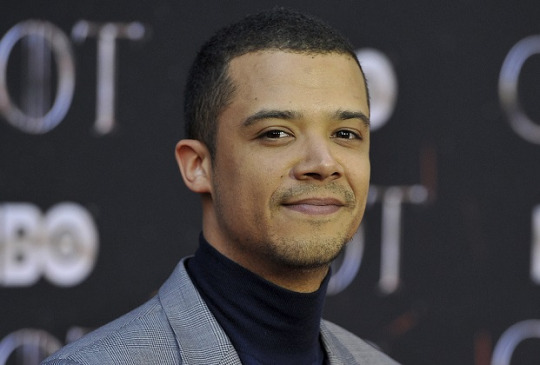
Deadline.com informs us that in the AMC adaptation for Interview with the Vampire, Jacob Anderson has been cast as Louis. I'm not familiar with him, but it looks like he’s a successful actor, from Game of Thrones and other things, he’s also joining Series 13 of Doctor Who. I’ll have to check him out from an acting standpoint!
Aside from his talent as an actor, this is by far the most controversial thing that's happened in VC fandom recently. I've been thinking about this for a few months now, talking about it privately online and offline, still gathering my thoughts. So this post is not engraved in stone, it’s initial thoughts on this.
I’m glad to see ppl talking about it and I’m sure we’ll have more public discussions. I’m trying to discuss it very carefully, but also, this is an entertainment blog, my opinions are mine alone, and I’m not looking for dogpiling on anyone, I have no obligation to respond publicly or privately to anything. Plenty of other ppl have differing opinions on this. So take all of the following with more than a grain of salt, I’m not being salty, I’m providing the links to the little info we’ve seen pulicly, I’m giving my initial thoughts, and I’m also trying to add a little levity because ultimately, again, this is an entertainment blog, and I try to add a little humor to help with such serious topics, humor can help ppl talk about controversial things.
-----
The casting of a POC/Black actor (I’m sorry I don't know the preferred terminology, let me know if you know what Anderson prefers) confirms at least one part of theilluminerdi articles that stated that Louis’ race will be different from the books. I didn’t post about these before bc I wasn’t sure how reliable theilluminerdi’s sources are (and I'm still not sure), but this was one major aspect that theilluminerdi announced before Deadline did, so now seems to be the right time to share those articles. For now, you can go check them out yourselves rather than have my reposting of the information, trigger warning: mentions of sex workers and race in the changes to the canon story of Interview with the Vampire.
>>>theilluminerdi articles from May 21, 2021 and July 15, 2021:
www.theilluminerdi.com/2021/05/21/interview-with-the-vampire-amc
www.theilluminerdi.com/2021/07/15/interview-with-the-vampire-amc-2

^Meme of Dr. Ian Malcom from Jurassic Park reads: “Your writers were so preoccupied with whether they could that they didn’t stop to think if they should.”
I’m using that meme with a little levity here, clearly an AMC adaptation of vampires in which the producers/writers have chosen to change the race of a main character (arguably the original protagonist of the series) isn’t in the same VICINITY as the dinosaurs in Jurassic Park that broke out of containment and killed visitors to the park, but John Hammond’s intention for the creation of that park was very good, as I assume this race change was intended. Time will tell.
“But with this place, I wanted to show them something that wasn't an illusion. Something that was real, something that they could see and touch. An aim not devoid of merit.”
“Creation is an act of sheer will.”
- John Hammond, Jurassic Park
Race is a more complicated subject than ever, so for AMC to make this bold change, I hope they have POC and Black writers on staff and are handling this very carefully. Even then, no racial group, including POC and Black people, are a hivemind, disagreements are bound to happen in the writing room, whether in good faith or bad. People have different intentions and motives, compromises will probably be made with the story in many ways, we all know how it goes with collaborations; the end product is a shared vision among multiple creators. This could be a potentially controversial adaptation, I don’t know whether they’re aiming for that or not, but with the elements it has so far, it seems to be headed that way.
Here's a comment by "Angellus" on the 5/21 article. It's undeniable that there's going to be the accusation of racism thrown at anyone who has any negative view of this change, regardless of their reasons. I find it unfair and narrow-minded that any negative response is automatically assumed to be coming from a racist point of view. To say that changing Louis' race is unequivocally an improvement fails to take into account how that change has a Domino effect on all of the other parts of the story. Not the least of which is that, if he is still a slaver/slave holder/plantation owner/(insert your preferred term) that adds a whole new racist element to his owning Black/POC people, even though, apparently there were Black/POC plantation owners.
Not the least of which: How will this change impact his relationship with Lestat? Particularly when Lestat has the added issue of being described in those articles as having “mind control abilities” and “insistent that he gets what he wants and when facing rejection,” a terrible combination in terms of consent, even in a relationship of the same race, let alone invoking Caucasian/white dominance over Black/POC people, AND Lestat being the catalyst to Louis’ questioning his sexuality:
Lestat is insistent that he gets what he wants and when facing rejection, petulance can quickly turn to ruthless rage which causes frenzied acts of horrifically brutal violence. Lestat also has mind control abilities. Lestat initially infuriates Louis, but this soon turns to fascination which leads Louis to question his religion and sexuality.

^Screencap reads: "I love how racist everyone is in the damn comments, this doesn’t pervert the story you’re all racist and it’s disgusting. I’m looking forward to it, I hope you keep crying your salty racist tears asswipes."
It makes me question whether Angellus truly believes what they wrote, if this is an ideology, or a troll. I would suggest their use of the term “pervert” is correct though, pervert means: “alter (something) from its original course, meaning, or state to a distortion or corruption of what was first intended.” That’s what this race change does, factually. Although, in this context, “distortion or corruption” carries a negative connotation. It would take a lot to show how this change does not meet the definition or “to pervert,” though.
I hope the rumours of Louis being a brothel owner aren't true
I agree 1,000%, I was hoping that these were just rumors. But, aside from the race change, if this were the only change, I find Louis being a brothel owner to be equivalently morally reprehensible to being a slaver/slave holder/plantation owner/(insert your preferred term). Ideally, they’d change his career to something that doesn’t involve benefiting from the bodies/labor of others in any morally reprehensible manner.
I mean, with a black Louis they can't have him being a slaver anymore, so maybe they're trying to find something that is also morally reprehensible for him to be.
He might still be a slaver. Who knows. Being morally reprehensible as a mortal man didn’t seem to me to be crucial to the story, but they still could have chosen something better. It seems to me like they want a brothel so they can have eye candy for an audience who want to see sex workers, maybe full frontal nudity.
-----
What also gets my attention is that Anne and Christopher Rice have not yet posted publicly about it, which leads me to believe that this change wasn’t their choice. They take every chance to brag when they’re proud of something, every chance to crowdsource about casting ideas or which VC books Anne’s fans liked best, etc., and in this case, as of Aug. 31, 2021, (and to be fair, maybe I missed it), I haven’t seen either of them post about this on the official VC FB, Anne Rice’s FB, Annerice.com, Christopher Rice’s FB, or christopherricebooks.com. If it had been their choice, I think they would have gladly trumpeted their credit by now, but maybe they’re waiting to do it in a specific venue. Time will tell.
#vampire chronicles#interview with the vampire#louis de pointe du lac#race#racism#tw race#tw racism#tw sex worker#jurassic park#memeything#ian malcolm#anon#ask#anne rice#christopher rice#long post#iwantmyiwtv has opinions#Jacob Anderson#vc casting
77 notes
·
View notes
Text
The freedom we give to ourselves
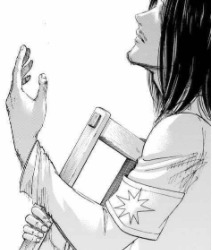
How does one find freedom in a cruel and cynical world? What does freedom even mean? What would it feel like? How will we know when we see it? These have been recurring questions throughout this story. We seem to explore attempts at the answer to this question through the perspective of characters.

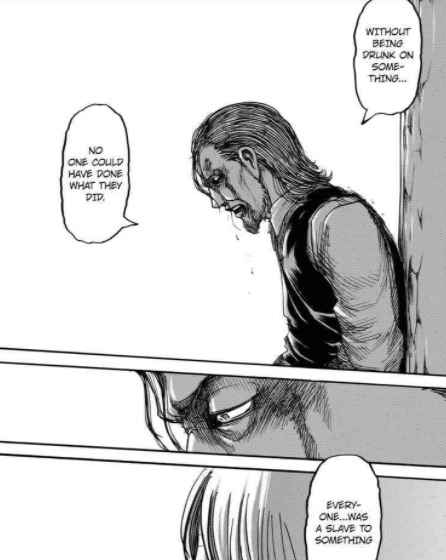
Kenny Ackerman’s life in pursuit of power led him to realise a truth about himself and the people around him. this idea of being drunk on something. That People need something to believe in to keep them going, to keep them from being broken by life’s suffering. Something that they hope gives each of their lives meaning. Each character’s pursuit towards this idea is what they believe will give them freedom from suffering.
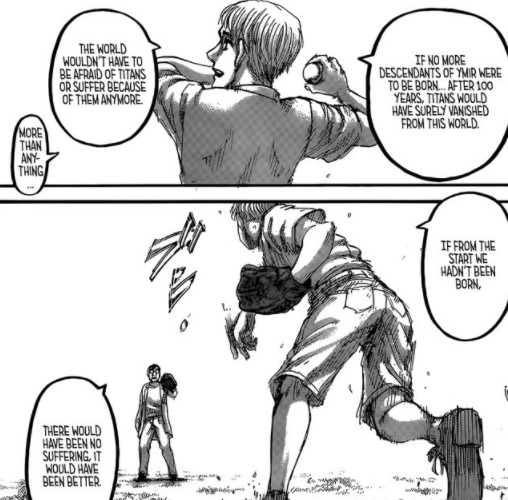
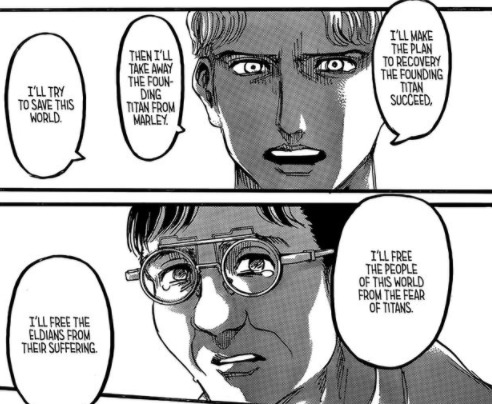
Zeke was no exception to this, he sees the suffering he experienced as a suffering inherent in being an Eldian in this world. He was drunk on the idea that his and the collective suffering would stop if Eldians ceased to exist.

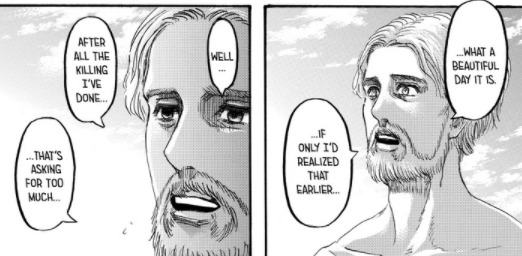
Despite this proposition, Zeke was able to find true freedom not by pursuing his personal mission through to the end but by letting it go. This push to move forward: to explain himself, his life, his suffering. It has brought him only more dissatisfaction and pain. He kept moving forward and when Eren took power from Ymir he was just sitting inert in Paths. It is not until his conversation with Armin that he truly looks back and reflects. Armin talks about a time where he was just having an aimless moment shared between loved ones. Zeke looks within and finds himself playing catch with Xaver. It has no meaning but it is a moment in his life where he’s not suffering but nor is he striving to push forward with some grand purpose. He is simply… existing. Without complication. Without justification. He is just someone who exists in this world because he was born into it. A simple moment with a profound effect: that life has intrinsic value and purpose regardless of how cruel it may seem. Zeke has now found that peace he was looking for his entire life. That feeling stays with him right up to the moments of his death. He can’t take back all the blood he has shed but for a few moments to take in the clear sky of the day. He can just exist.
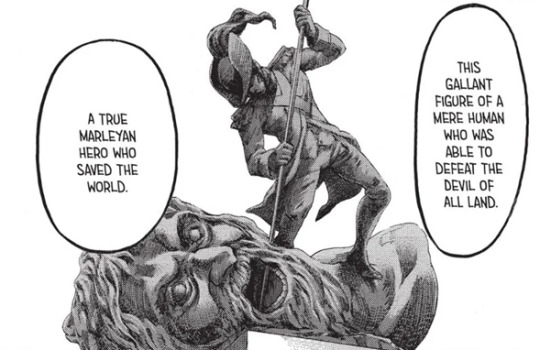
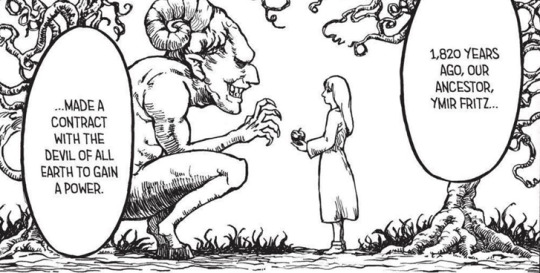

There has been an exhaustive debate in and out of the story of who or what the true devil of humanity is supposed to be. The devil of all earth that plagues humanity. I don’t believe it is Eren but I do believe he is the person in the story most seduced by it. I put forward that the devil of humanity isn’t a person born once in a generation, it is not a creature or some sort of supernatural force. The devil of humanity is the cycle of violence itself. A tiny glimmer of light or fear of the dark that pushes us into war, into chaos, into hell.
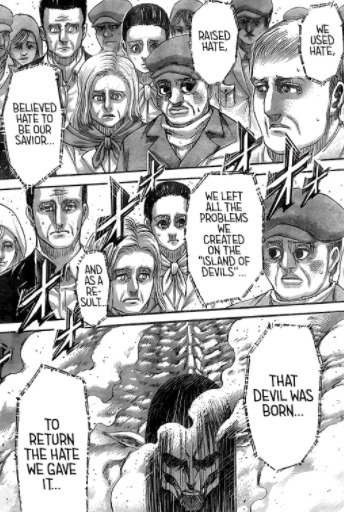
We may believe we see something beyond it. Something we can gain or something we fear will be taken from us if we don’t answer the call: “Do this and your dream will come true, you will be safe, you will be loved, the pain will stop” Just once. Then once again. Then once more. Before you know it, you are gripping the wheel of a sinking ship so heavy you have no hope of turning it on your own. But that may be the very thing that can stop it. Hope. The hope you give yourself in small acts of faith. Kindness. Compassion. Empathy. Seeing beyond the walls that trap your spirit. Not to seek out freedom taken from you but to reconnect with the freedom you always had that never left, your humanity.


If this is Isayama’s message, that freedom is in finding one’s humanity. One finds freedom by reconnecting with their humanity. I put forward that the most free person in this story has been Mr Blouse, Sasha’s father.
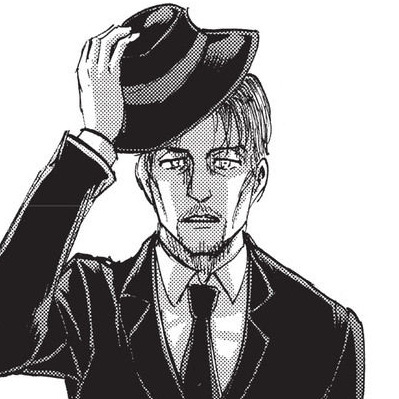
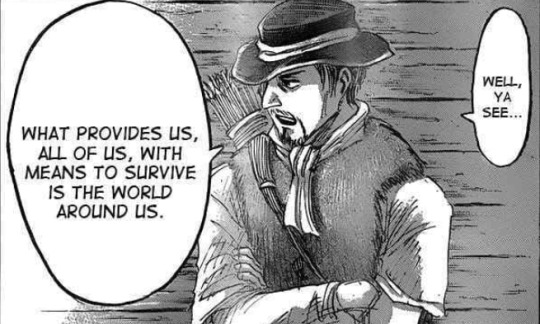
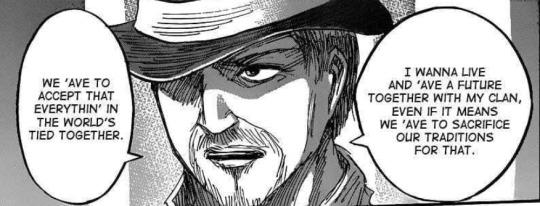

Mr Blouse is the person in the story most consistently connected to his own humanity and humanity as a collective whole. He makes it a principle to stay connected to it. So much so that when given a justifiable choice to take revenge on Gabi for killing his daughter. He instead chose to forgive her and console both her and Niccolo showing her the most humane act she had ever received. She did not have to justify her existence as a good Eldian in that moment, she was accepted as another person who deserved to exist even if she’d made mistakes.

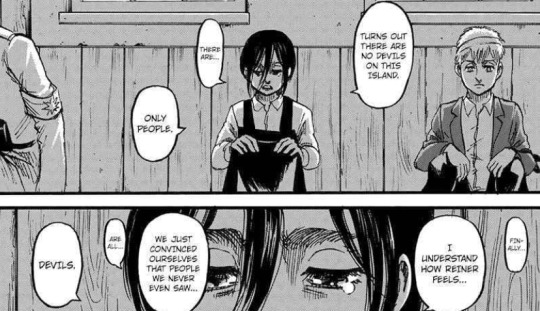
From Gabi’s experience and perspective, nothing made more sense than Mr Blouse killing her for what she did. What he decided to do was so simple yet its impact was profound. He reached Gabi because he saw something real beyond answering hate with hate. He sees a precious freedom beyond this cycle, and now thanks to what he did Gabi can see beyond it too and was able to find her humanity.
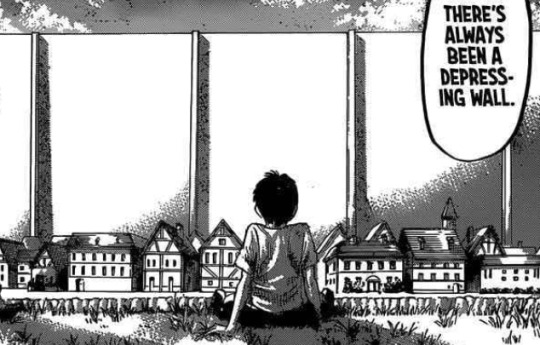
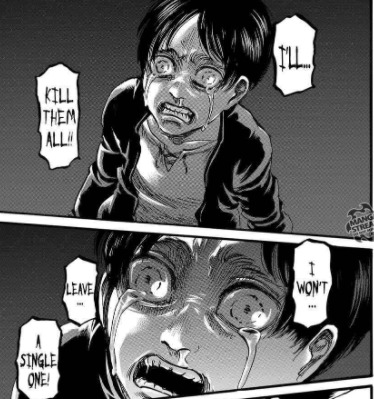
How does this relate to the main character of the story, Eren. Eren’s case is a very tragic one. No one is more emotionally attached to the idea of freedom than Eren, it has a specific imprint within his psyche. However there also lies the imprint of the wall within his psyche and all the trauma associated with it. From an early age Eren, at his most traumatised, found a resolve to find freedom from this horrific nightmare by destroying those who took his freedom from him at any cost. But in finding this resolve and trusting it above anything else, he had unknowingly damned himself.


The wall is so strongly associated with trauma in Eren’s mind, and now with the release of the wall titans, he is literally weaponizing his trauma and aiming it at the rest of the world. Yams is establishing that humanity is the only real freedom we have and Eren had always expected freedom to be beyond the walls. However, because of Eren’s compounded trauma, humanity is the ultimate enemy. In sacrificing his humanity and wiping all of it from the outside world, he is destroying the freedom he wanted for himself and for everyone in the world.
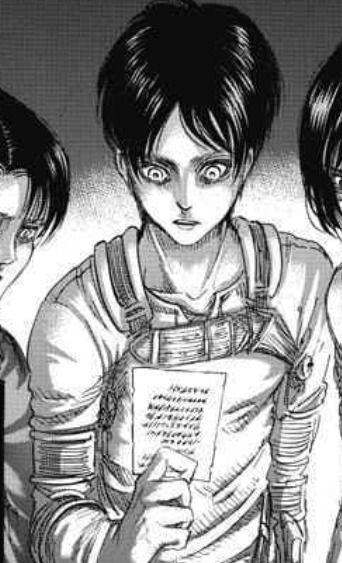
This happens all in the basement of his old home in Shiganshina. Eren was on the cusp of moving beyond his trauma when suddenly all of that pain, all of those triggers were reformatted, given new context when he learned the truth of his world. Why all of this pain and suffering happened to him. Once he met the formative father of his new world rebirth – Eren Kruger.


Eren has found stability in this turmoil by latching onto Kruger’s mindset, believing Kruger to embody what he needs to be to save those he cares about. In this new large and scary world, Eren sees Kruger as the person he will have to be to exist, to make a change. Eren has assimilated Kruger into his identity, evident from Eren taking Kruger’s name during his time spent in Marley. In how we are introduced to him post time skip, Eren is pursuing action using Kruger’s words to young Grisha about the Zeppelin.
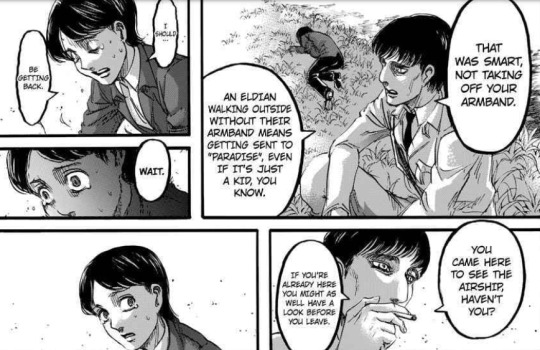
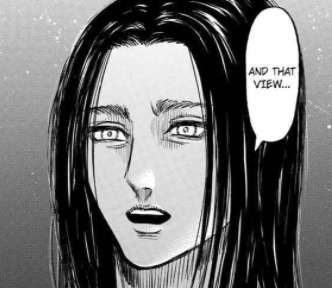
Freedom is hard fought and after fighting tooth and nail and suffering and pushing as hard as he can, he will have his freedom.
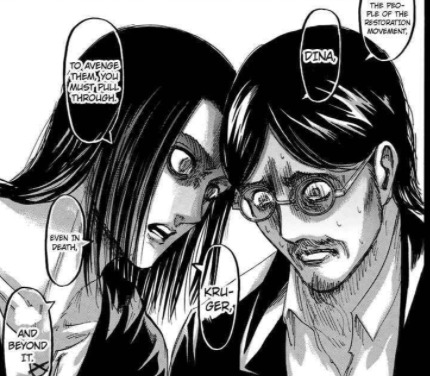

Culminating in the Jaeger trio at the Reiss family cave, we finally see how far Eren’s resolve has pushed him. Eren is not the devil but he is the one most seduced by it (pushing forward the cycle of violence). He tells Grisha to do this to justify his own belief that this was necessary. To sacrifice his humanity, the humanity he managed to find in the walls after a life of pain and anger as soldier of revolutionary radicalism. For Eren, sacrificing one’s humanity is what is necessary. But Eren misunderstood what he was supposed to take away from Kruger’s life.



There is an additional meaning behind Kruger’s final words to Grisha – in sacrificing his humanity to get to this point, he has lost everything precious to him. All that exists is the end goal, the zeppelin. Seeing the zeppelin is… all there is. It won’t give you back what you lost or what you have told yourself you need to take back: aka your humanity. Eren’s “sight” is the zeppelin and he believes seeing it will give him back the freedom taken from him. It’s no coincidence that Grisha looks like Eren when he reflects on the day that traumatised him the most.
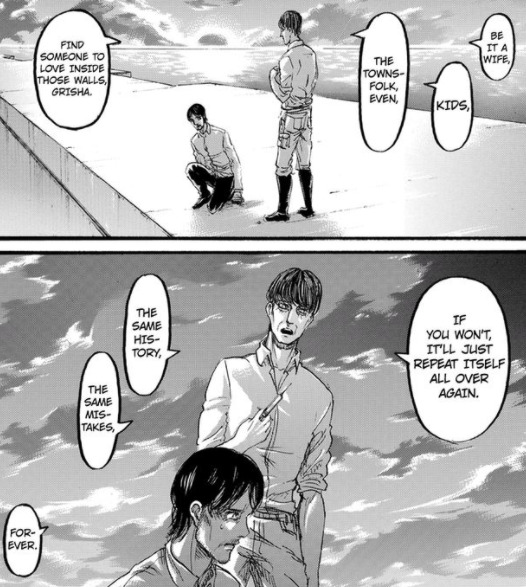
We see Kruger talking to Grisha further after he is given his mission. As Kruger prepares the serum for Grisha he mentions that he won’t know who will be watching this memory. If we take the ironic nature of this story into consideration, this can also mean that he doesn’t know if whomever is watching these memories will stop watching before he is about to say what he says. It takes place at the end of the chapter after we see Eren finding his new resolve and coming to grips with what he has learned and what he needs to do. This may be implying that this further discussion between Kruger and Grisha is something that Eren didn’t actually see. Kruger’s final important message to Grisha is to love someone. Be it a wife, a friend, the people around you. In specific terms, treasure your humanity and preserve it no matter what happens. Like Mr. Blouse, treasure the humanity found in others, even in enemies who have wronged you or may wrong you. Because that is what it means to find life intrinsically valuable. That is the only way to end this cycle of violence and ironically what Kruger has realised after losing so much of his own and now Eren in turn.


So if the path to freedom is to find one’s humanity does this mean that the cycle of violence can be wiped out and the devil of humanity will stop plaguing the world? I don’t think that’s a question Yam’s is capable of answering nor does he intend to.

However, I think he may propose that if it is possible for the main character of the story, the one who has been the most seduced by the cycle of violence and spilled the most blood is able to give himself back his humanity after willingly sacrificing so much of it. Then there is hope for anyone of us to find true freedom. Not everyone, but anyone. Because not just knowing but realising that we are all human, and valuing that, is what makes us truly free.
#snk 137#aot 137#snk theory#snk Eren#Eren#Eren Jaeger#Zeke Jaeger#Kenny Ackerman#Armin#aot meta#snk meta#Willy Tybur#aot theory#Sashas dad#Paradis#Ymir Fritz#Ymir#Paths#snk paths#Eren Kruger#Kruger#snk niccolo#Grisha Jaeger#Gabi#Snk Gabi#Gabi Braun#snk freedom
263 notes
·
View notes
Text
5 Tips for Finishing Your Novel
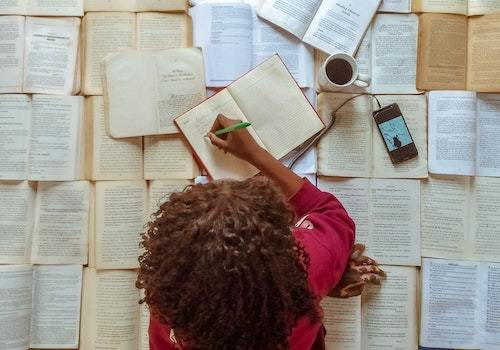
April’s session of Camp NaNoWriMo is drawing to a close, and you might find yourself nearing the end of your novel. If you need some tips on writing and polishing the ending of your story, author Derek Murphy is here to share a few! Plus, you can check out the rest of our novel-finishing resources on our #NaNoFinMo page.
You won NaNoWriMo and have a 50k collection of scenes and sentences, but how do you clean it up and get it done? How do you make sure it’s finished, satisfying and enjoyable? Here are 5 powerful strategies for finishing your novel and some helpful writing tips that will push you past the finish line.
1. Give it a satisfying resolution.
In order to have a powerful story, your book should probably focus on a main character’s change or transformation. There’s an inner war, a.k.a. the character’s emotional healing, and an outer war: the conflict that forced the reckoning. If it’s a purely symbolic internal realization, you can mirror that with actual conflict in the real scene: the breaking of a dish, a fit of rage, a sudden ray of sunlight (or a storm… this should not be pleasant; It’s a breaking point and spiritual death/rebirth).
You can clarify the moment of change by setting up an illustrative contrast, a before and after, that shows how those internal changes have resulted in real-world consequences or benefits. Each character’s unique challenge will match their personal weakness or fear. The price for victory is the one thing they have so far refused to do, or something they cannot give up or bear to lose.
Make sure your protagonist has gone through a transformative struggle to arrive at deep insights, knowledge or awareness. Find a way to deepen the incidental scenes so that they become instrumental to a deeper purpose, leading towards an identity-shifting event.
The plot is what happens, and it’s important. But you can make it more dramatic and meaningful by making sure you demonstrate how hard it was and what it cost. It matters, it is remarkable, because it forced your protagonist to change.
Your conclusion might include:
Physical tension as allies perform a tug-of-war battle against resistance, that shows how difficult this struggle is, and how much force is required.
The consideration phase, as characters are tempted last minute or the price for victory is revealed: the sweet memories that give them awareness that this fight is worth the cost or risk (you need to show them making the choice, knowing what they will lose).
The final flashback, as the full backstory is revealed so we can see exactly why this conflict is so difficult or meaningful for the main character.
2. Add (unresolved) conflict.
Your story is made up of the events and scenes, where something happens. Each new event will push the characters further into the plot. Slow scenes where nothing is really happening can be red flags, so the first thing to focus on is increasing conflict, drama, suspense and intrigue. This is what creates urgency. The full reveal, demonstrating why THIS challenge is so difficult and powerful, should happen just before the final battle or resolution.
You want to make sure every scene, especially in your conclusion, has enough conflict. I recommend these three:
Outer Conflict (threats): Challenges or obstacles that prevent the character from achieving goals.
Inner Conflict (doubts): Moral struggles, decisions, guilt or shame, anger.
Friendly Fire (betrayal): Strong disagreements between allies or supporting characters.
You want to extend and deepen the potential conflict, without resolving it too easily. The biggest destroyer of conflict is conversation: when your characters just sit around and talk to each other. Most conflict involves a lack of information, and a desire for clarity. A lot of conflict is perceived or imagined.
The most important information needs to come last, and come at a great price. The information that has an emotional impact, and influences their actions and decisions, should be big reveals at dramatic peaks. A surprise or twist should be treated as an event: each scene is leading towards a change or new piece of information that provokes the protagonist to respond.
3. Fill plot holes with character motivation.
After you’ve made sure that “what actually happens” is intriguing (opening questions and raising tensions without resolving them) you can focus on making sure the plot holes are filled, and characters are properly motivated – these two things are usually adjacent.
You can find and fill plot holes by asking:
Why are the characters doing this?
Why does any of it matter?
Basically, readers need to respect the main characters enough to care what happens to them, so their choices and actions need to make sense within the given information. If there’s a simpler, easier solution, readers will get stuck up on “why didn’t they just…”? To fix plot holes and gaps in logic or continuity, or make the story go where you need it to, you can add urgency, fix the mood of the scene (bigger stakes require bigger justifications), show characters in a weakened mental state, or raise concerns but have them dismissed, with an excuse or justification.
You need rational characters to make plausible choices that lead to dire consequences. You need show why they don’t do something easier, or nothing at all, or why they face clear challenges, despite potential obstacles.
They’ll also require a deeper motivation, for why they’re willing to put themselves in identity-destroying conflict, rather than just giving up or running away. Why do they stay in THIS fight, when they’ve run from similar ones? If they weren’t ready at the beginning, why are the ready now – what changed in them, as a result of your story’s journey?
Your protagonist needs to have a strong, consistent internal compass, and it needs to be revealed through incidents that establish their character. This is who they are. Without this reliable core identity, we won’t be able to tell a story that forces them to change.
4. Let readers picture your story with detailed description.
In the final stages of revision, you can begin improving the description with specific details.
It’s smart to start – or end – a chapter with a vivid, immediate scene. You want to leave readers with an image they can see in their minds, hopefully connected to the feeling you aim to evoke. You can close a chapter with a reference back to a motif or image, with a deeper or more reflective context; applying meaning to the metaphor. This will help readers feel engaged, be moved, and leave a lasting impact.
Vivid scenes are mostly a matter of detailed description, so add the specifics about the story environment. Be precise, not vague. Instead of “she put a plate of tea and snacks on the table” you can write “she gently placed an antique porcelain teapot on the table. I could smell it was Earl Grey from the scent of bergamot. The half-sleeve of Oreos and can of onion-flavored Pringles seemed incongruous with the fancy dishes, but I knew she was making an effort to welcome me.”
Focus on the sensations and feelings; but also zero-in on any potential sources of conflict or internal emotions or states of mind. In my example above, the host might be nervous or ashamed of her spread; or perhaps she has a degenerative brain disease and doesn’t notice the incongruity. Tensions are unspoken, potential sources of negative feelings. They hover in the background of your description.
Readers will remember the pictures you put in their heads, not the words on the page.
Description should serve and be bound to the story, not distract from it.
It should be squeezed into and around the scene action, when the protagonist is using or exploring.
Show what’s different, not what’s the same.
Leave space for readers to fill in the gaps, but get them started in the right direction so they aren’t surprised later.
Sidenote: be careful about your metaphors, analogies and similes. Each one will put a picture into readers’ minds, and it can quickly get overcrowded with imagery. You’re asking them to ignore your real scene and think of something else. Use them to confirm and amplify the scene you have, and limit distractions.
5. Prepare to publish.
Typos are bad, but perfectionism will ruin you. This section is about editing and proofreading, but I don’t have time for all that, and you don’t either. The real problem with a story is rarely the number of typos. A very clean book isn’t better if people stop reading.
You can solve a lot of common writing problems, with my big list of 25 common writing mistakes, and self-edit your manuscript to make it as good as possible. After that, a copyeditor or proofreader isn’t always the best investment (and it can also be the biggest publishing cost).
Instead, use an editing software (I like Grammarly) to root out obvious mistakes, but don’t dwell on the small stuff like perfecting every word or rearranging the commas. Spending a very long time wrestling a poorly-written manuscript in shape is less effective than getting something (actually) done to the point where you’re comfortable sharing it.
This may be difficult at first, but you can’t learn and improve without genuine reader feedback (from people who aren’t your mom or best friend; nor the short-sighted opinions of a self-proclaimed literature enthusiast). You need to find readers who enjoy your particular genre, and the sooner you find them, the more valuable feedback you can get.
Shorten the feedback loop: Get over the fear and focus on learning by getting feedback early and often. However, this doesn’t just mean joining a writer’s club: writers are brutal and might focus on trivial things. The safest bet is to make it public, on Wattpad at least. Or get a cheap cover and throw it up on Kindle, Draft2Digital or even your own blog.
Making it public is scary and vulnerable, but it’s better than letting the fear of messing up keep you from the brutal, necessary experience of allowing readers to tell you what they liked and disliked about your writing. Will some people be critical? Yes! But guess what, you’ll get negative reviews even if you’re a brilliant, famous writer. Those are inevitable. And the first negative reviews may teach you more about writing than 10 years attempting to self-edit, afraid of putting your book out into the world.
PS. You can use resources, like my 24-chapter plot outline, as a way to spot story gaps in your manuscript and improve the structure (especially if your book suffers from a “soggy middle.)

Derek Murphy has a PhD in Literature, writes urban fantasy and is the founder of the alliance of young adult authors. More recently, he’s started sharing writing tips on http://www.writethemagic.com
Top photo by Adegbenro Emmanuel Dipo on Unsplash.
#nanowrimo#camp nanowrimo#nanofinmo#writing advice#writing tips#finishing a novel#by nano guest#derek murphy
146 notes
·
View notes
Text
How much do we really know?
I really don't understand how any BTS shippers can be confident enough in their ships to turn into “supporters/believers” that believe their ship is real 100%. For any ship. Like even deep diving into some theories or getting literally 100+ reasons from various believers own mouths for why some ships have to be real, nothing has been big enough to count as proof in my opinion. (Of course this includes Vmin.)
Like... They all have questionable moments. Some more than others, sure. But proof of more than very strong and unusually intimate friendships? No.
You could argue some things seem “gay” or has possible LGBTQ+ connections. Like GCF having a LGBT+ song, or 4 o'clock including a reference to a gay movie, or Vmin's literal gay drama whatever that was. But most of it is just fans zooming in on various things and adding their own meaning to it. Like it has to mean something becaues it is connected to your ship. (But only for your ship.) Sometimes, a lot of times, it’s not even directly connected to the ship... It’s just assumed to be connected to them. It’s a guess or a theory, not a fact.
I get questions from Vminies not knowing things about Vmin all the time, and I myself know I’ll never be able to remember or even see everything that is out there with Vmin. And that’s just from the content we are able to consume to begin with. Beyond that is a lot of guessing and assumption based on the fraction of moments we get. But if some Vminies might not even know where the soulmate label comes from, or that 4 o’clock was written with Jimin in mind or that Vmin seem to casually sleep together in private (if we take Tae’s words for it in the Billboard vlive) it’s clear that something I might see as obvious and common knowledge isn’t. Even further it’s clear that other shippers will know even less about Vmin.
And how can you dismiss something you don’t even know about?
We all focus on, remember or look for/get exposed to our biases or favorite ships the most. Even if we consume the original content we will likely zoom in and see things for our own ship simply because we look for it. And there is nothing wrong with that, it’s natural. But we need to realize it means we will miss things when it comes to other ships, and need to be aware that we know more and end up in echo chambers of both facts and interpretations for our own ships.
It’s so blatantly obvious to me that many non-vminies have no clue about even some of the biggest moments between Vmin. And again, it’s nothing really odd or bad about that... Until you start to act superior even when you lack a lot of knowledge. So much misinformation is spread this way too...
That’s why even though I personally think I know more about other ships than perhaps the regular person, I still won’t preach or explain too much about other ships. Because just as I know others don’t seem to know or notice a lot about Vmin, I know I work the same in regards to other ships. I can’t possibly even remember everything when it comes to Vmin, so how can I with all other ships too?
If I get questions about tae/kook or ji/kook or any dynamic in BTS I might be able to answer it... But I might also lack the full context or might not even have noticed some things to begin with. Coming to me with questions about other ships will give you a very different view than if you ask a shipper focused on that ship directly. I try to be unbiased, but I can’t. I try to be informed but I can’t remember or notice everything. So even if I feel I know a lot, I might never know enough to get the full context of any situation regarding BTS.
Of course trying to remember to watch unbiased content is very important and helps to keep a better balance. Or as in my case where I actively looked up other ship theories and felt “I know enough to see there are weird things and I can’t dismiss everything since we don’t know the truth of what it might mean”. Just as I feel a lot of things about Vmin shouldn’t be dismissed. Many other shippers also came to me and talked long and detailed about why their ship is real and my isn’t. Many times I lacked knowledge about specific situations about other ships, but so did they about Vmin. I don’t think you can dismiss something if you don’t even know about it to begin with, and there is a big gap of knowledge between the shipping communities.
I mean, the way hyung x maknae line ships have so many great moments and you barely see them outside of the actual content. At this point all ships in BTS are big and get attention, but they don’t seem to register the same way in people’s minds, with the focus always being on the three youngest together.
This is the thing about worrying about “rival ships” too... They only matter if there is a moment between the ones you already see as “competition”. Does anyone worry or cry about Vmin or Ji/kook when Ji/hope or Hope/kook get very intimate and sweet moments? No, because they don’t seem to register at all.
I wasn’t even able to find a gif of this ji/hope moment from Run recently... (And I can’t add twitter videos from desktop)
youtube
Yoon/min holding hands and joking about breaking up.
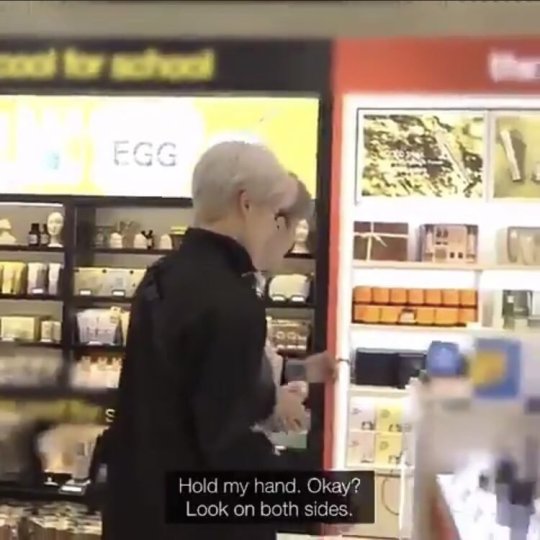

Meanwhile if Tae/kook have fun together or if Ji/kook does something cute all hell breaks lose. We have been tainted by the narratives from shippers. The more we see and hear about other ships the bigger “impact” they will have on us.
If moments like this between other members doesn’t make me feel insecure about Vmin, then why would any similar moment from Ji/kook or Tae/kook? People need to stop hyper focusing on both skinship and “rival ship” moments in general and stop adding importance to them, especially when they don’t even do it equally with all ships.
It’s not that one is good:
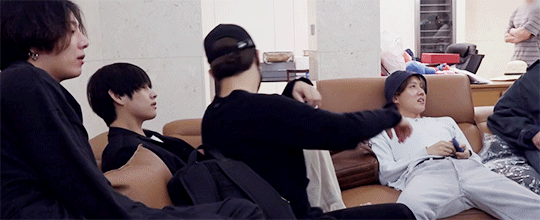
One is neutral:
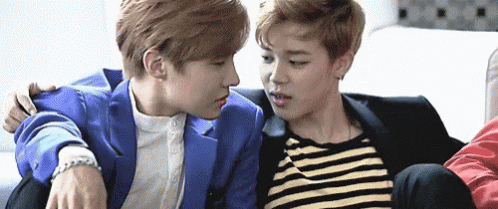
And one is bad:
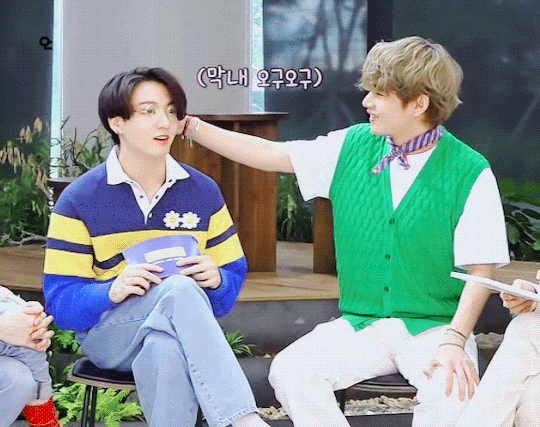
They all happen and exist and we need to realize that’s how it always has been and likely always will be. Any interpretations of these moments shouldn’t change how you view them when nothing is even confirmed. They all happen so we should all accept that and be happy the members have close and intimate relationships with each other.
I really don’t think people understand my stance on all of this. I literally don’t mind if another ship turns out to be real (even if any ship being real is probably not that likely), because I trust in Vmin’s relationship after having watched it for 5 years. But since nothing is confirmed I still remain of the opinion that Vmin’s relationship and behavior is weirder than other ships IN MY VIEW, based on MY INTERPRETATIONS. But I am totally ok with being proven wrong, because it doesn’t matter what kind of relationship Vmin have as long as I can trust that the love they express for each other is real. Thus I also don’t have to downplay moments between other ships. They are there and that’s nice.
We lack a lot of information for many reasons even though we do get to see a lot. But even knowing all the things we know, I still don’t think it’s enough for any ship moments to count as “proof”. For example with Vmin, they were denied to sing a song because it was essentially “ too gay” and Taehyung complained about it, but that doesn't mean they have to be a couple and is forced apart by Big Hit.
We put weight into things because we have our biases and guesses and we find things because we look for them. Here are just some things that fans of various communities says have to mean something but to me really doesn't have to mean anything even if proven:
Physical intimacy
Emotional intimacy
Jealousy
Screen time
Fanservice
“Sexual tension”
Heart eyes or any looks in general
Joking about being a couple
Showering together
Sleeping together
Being alone together
Living together
Writing songs about each other
Secret signs
Hidden messages to fans
Hiding in rooms
And so on...
But even If you do want to count these things to mean something, at least acknowledge how many of those things other ships have too. Vmin literally have several of these confirmed as well. Many of these moments either have happened or gets speculated to happen between many ships. You might find your ship isn’t as uniqe as you feel it is if you actually start diving deeper. If you did and it makes you doubt your own ships superiority, that’s good. Being sure won’t lead to any good for anyone.
Also if you wanna go there.... If other shipper say these have to mean something they are either ignoring Vmin or more likely doesn’t know or say it doesn’t mean the same if they do it.
Fine if hand holding and cuddling doesn’t make you wonder about Vmin, that’s totally legit. In fact you don’t have to wonder about Vmin unless you want to. But using excuses for why something doesn’t mean something you don’t want it to mean or downplaying moments or automatically calling them platonic and “not the same” doesn’t mean you can’t be wrong about those assumptions. Especially when you might not know the full context of it. Again, it should go both ways and include moments from all relationships.
I am legit curious how ji/kookers and tae/kookers are able to be so confident about their ship being real with Tae doing the things he does towards Jimin.... Like... They mean to tell me Tae and Jimin being soulmates, Tae wanting to sing a romantic Christmas song with Jimin, Tae writing 4 o'clock, Tae having Sweet night and telling us it's a personal song while he keeps calling Jimin his only best friend doesn't even have a possibility to mean something non platonic? 😗
Soulmates + Friends lyrics + "how could I know one day I would wake up feeling more" + "are you my best friend?" + "sweet night is a personal song" + "Of course Jimin is my only friend" + 4 o'clock/dumpling fight + the not allowed Christmas song + "Jimin-ah I like you the most" + "I told him to come sleep next to me as I was too lazy to go to him" + “we told our candid stories as honestly as possible” + “Oppa, why are you still awake? I’m dreaming of Jiminie” = Vmin is probably the best known guess to what relationship Tae might be talking about in Sweet Night.
Is it confirmed though? Can I call it proof? NO! Because while it fits in theory, we don’t know and we don’t have all the information to know. But I can make a damn good case for it and that’s the whole point. I can do that because I look for material, see things and add them together with a narrative. Just as other shippers do with their ships. In the end it’s all just narratives though, not proof.
Getting all these asks recently just confirms that the people who worry, or who says other ships are real, haven’t read even a fraction of my posts or they just don’t understand them. Or let alone noticed major moments between all BTS members that should show that their belief is not as “obvious” as they might think.
I am tired of insecurities when it shouldn’t even matter. If any ship in BTS is real, let’s support them and be happy. It doesn’t change the dynamics and relationships between the other members if some of them happen to be a couple. What we see is still there. The “worst” that can happen is that our ideas and theories prove to be wrong.
But let’s at least try to be aware of how little we see and know, and especially about ships that aren’t our own. I am writing about Vmin because there is a lot to see, but me focusing on Vmin also gives me a knowledge about them I can’t compare with other ships. Which is why I won’t sit and write essays about other ships, and which is why Vminies coming to me for information about other ships is going to lack the depth I can provide for Vmin. All shippers are biased and all shippers lack information.
If you want to ship do it, if you want to speculate go right ahead. But be aware that there is a big difference between facts and knowledge and narratives and speculation.
I hope you found this an interesting read. And if you are considering sending me asks worried about Vmin because of interactions between other members or you want to send “statments” or explenations about other ships being real, just know you are barking up the wrong tree.
#vmin#bts ships#shipping#btsandvmin#rant#vmin analysis#shipping analysis#bts analysis#shipping narratives#shipping agenda#my post
87 notes
·
View notes
Text

How did it all start, the erasure of bi people in law and politics, even by the LGBTI-rights movement itself? With bis actually comprising more of the LGBTI population than gays or lesbians, how did we come to be made so invisible, even within LGBTI-rights discourse?
The “how” and the “why” are two separate questions. The “why” is eloquently (although in dense academic language) tackled by Yale Law Professor Kenji Yoshino in his article, The Epistemic Contract of Bisexual Erasure. Yoshino’s article describes in detail the driving forces, both benign and not, of bi erasure. As with many things, it may come down in large part to insecurity: people are threatened by what they don’t understand, and by realities that threaten their rigid paradigms.
For example, Yoshino explains, gay and straight people find some comfort in being able to identify sexual orientation on sight: if one sees a same-sex couple, one can safely assume the members of the couple are gay, and if one sees a different-sex couple, one can safely assume the members of the couple are straight. Except that the existence of bi people renders such assumptions not so safe at all, but rather, fundamentally flawed. Which makes both gay and straight people uneasy, for not dissimilar reasons.
As Yoshino and many others have explored over the years, there are other more complex factors at play as well driving bi erasure. But, leaving the “why” aside, the “how” it all plays out is a bit more straightforward (no pun intended). This article gives a brief snapshot of at least some of the history of bi erasure in LGBTI-rights political discourse. The next article in this series will give a parallel snapshot of how that bi erasure has evolved in LGBTI-rights legal discourse more specifically.
To preface, “gay”, “straight”, and “bi” are all relatively new identities. Since the beginning of time, in every culture, it is likely that people engaged in homosexual or bisexual conduct, without sexual orientation labels being attached to that conduct. For example, Plato’s Symposium can be read, in part, as describing the sexual fluidity of an ancient Greek society in which men often had male lovers in addition to their female wives. But the ancient Greeks didn’t use the ancient Greek equivalent of “gay, straight and bi” identity labels (although the Symposium’s stimulating lover/beloved dichotomy is a binary of another sort). The word “bi” was no more included or erased from discourse in those days than “gay” or “straight” was.
It was only when “homosexual” and “gay” became common labels in modern society that the comparative absence of “bisexual” and “bi” from political discourse became apparent. Rather than the label “homosexuality” applying only those with solely same-sex attractions, those who had both same and other-sex attractions also got swept up in the “homosexual” label rather than being acknowledged as “bisexual”. In other words, “homosexual”, and, eventually, “gay”, evolved as the default labels in political discourse for everyone who engages in same-sex intimacy, whether or not they also have different-sex romantic partners and attractions.
Even Alfred Kinsey’s influential research in the 1940’s–which revealed how fluid sexuality is and how uncommon it is for people to be unwaveringly homosexual or heterosexual–was bi-erasive in terminology even while being positively bi-revolutionary in its impact: Kinsey himself disliked, and did not employ, the term “bisexual” as a label describing bi-sexual orientation.
Bi invisibility and erasure to this day is pervasive in political discourse as well. For example, despite lobbying from bi activists, LGBTI-allied legislators and even many LGBTI-rights groups still insist on using the titles “Gay Panic Defense Ban” or “Gay and Trans Panic Defense Ban” to describe legislative efforts to ban those who commit violence against LGBTI people from defending themselves on the grounds that they were provoked by the victim’s sexual orientation or gender identity. As ten-year old Anthony Avalos would attest, were he still alive to do so, being brutally murdered for being queer is something that happens to bi children too. Although The Advocate, with unfortunately bi-erasing inaccuracy, reported he was killed for coming out as gay after saying he liked boys, the full story is that Anthony was beaten to death, allegedly by his mother’s boyfriend, for coming out as bisexual and saying he liked boys and girls.
Just as Anthony’s bisexuality, the very reason for his brutal murder, was erased by a prominent LGBTI media source, so is the broader reality of violence against bi people every time the LGBTI-rights movement pushes legislation that includes only gays and trans people in its name, not bi people. It has been, so far fruitlessly, pointed out to those who insist on omitting “bi” from the “gay and trans” titles of such legislation (if not, thankfully, from the bills’ legislative protections) that such bi erasure is both inaccurate and harmful to bi people, who suffer disproportionately high rates of violence and hate crimes compared to even lesbians and gays.
Sadly, the response to the call for bi-inclusivity in naming LGBTI-rights legislation has been a collective shrug and half-hearted justification that this is just the way the bills have always been titled (although they haven’t; they’ve evolved from “gay panic” to “gay and trans panic”, so why not evolve a bit more, to “LGBTI panic”?).
Change is hard, so it is said. But being excluded by name from protections from hate violence, having our very existence erased by those who are supposed to represent us, is harder. It’s not too late to start being inclusive of the bi community, and, in the process, more accurate about the demographics (and honoring of the lives) of those who are victims of violence because of their sexual orientation or gender identity.
Panic defense ban legislation is just one of many contexts in which bi people have been omitted from the titles of legislation. The good news, and bi people should take this to heart, is that the actual text of these bills does protect against sexual orientation and gender identity discrimination broadly, which applies to bi people and other queerfolk alike. Which just begs the question: if the actual substantive text of laws can be written to be bi-inclusive, why can’t the titles of the legislation as well? It’s not such a big ask.
An even more important policy ask, that has been made over time by members of the bi community, is for bi people to be not just acknowledged, but counted in our own right in research and the collection of data that determines the allocation of resources to communities in need. This, and other bi-aware policy protections for bisexuals that are solely needed, would go a long way toward protecting the bi community, the largest but least politically acknowledged group within the LGBTI movement.
To solve the problem of bi erasure in LGBTI-right discourse, policy and politics, it will help if more out bi lawmakers are elected to office (such as Congresswoman Kyrsten Sinema, who has a shot at advancing to the U.S. Senate this fall). But it doesn’t seem that bi legislators are going to flood the state capitols or advance to Congress in great numbers any time soon. So in the meantime, we desperately need our own community — the broader LGBTI rights movement, LGBTI media, and LGBTI-friendly legislators — to step up, hear our voice, and say our name.
#bi tumblr#bisexuality#lgbtq community#bi#lgbtq#support bisexuality#bisexuality is valid#lgbtq pride#pride#bi pride#bisexual#bisexual history#bi history#bisexual community#support bisexual#support bisexual people#bisexual injustice#biphobic gay people#biphopia#biphobic#bi erasure#bisexual erasure#bisexual facts#bisexual info
53 notes
·
View notes
Text
/rp
DreamXD actually slots very nicely into a working theory I've had for about two or so months now, mainly centering around one question:
What happened to Dream?
Namely, why did Dream change, when exactly did it happen, and was it solely an internal change, or was there an external force at play, specifically a preternatural one?
I think with DreamXD, we might finally have an answer.
Or at least some clues to follow. DreamXD presents a shift in every single paradigm the Dream SMP has had. Like, I think most of it is just being so utterly blind-sided by George Lore Real, but part of it is the massive ramifications of an Actual God* being present in the storyline.
((*On the other resident god of the server, Foolish:
DreamXD is different than Foolish, in that his characterization is so dramatically inhuman - Foolish talks and acts like a (somewhat eccentric) person, and his powers are, as far as we know, limited in comparison to the creative-mode godhood that DreamXD occupies. And whether that is because Foolish is not a "full" god (having been referred to as a demigod) or simply because he's spent so much time around humans, we don't know, but we do know that either way, DreamXD is NOT that.
DreamXD's voice is marked by glitches and dramatic shifts in tone, he seems to lack control over the different aspects of his personality, like the more "Dream" part vs. the darker one that threatens to eat peoples souls. The "normal" part even displays confusion when George references things that the "darker" part said, implying that it may not be fully aware of itself.
TLDR: Foolish acts more human than DreamXD, who has a very eldritch personality.))
To get right to the point:
The Dream we knew before November 16th, and the Dream we know now are not the same. Something changed, and it changed for the worse.
Consider: Dream was always antagonistic to the L'manbergians - he was always imperious to them, and he was responsible for starting a number of fights between his faction and theirs, just as many if not more than they were.
But, he was also not... evil. He'd pick fights with Tommy, the disc wars were still a thing, but the gravity of the spats they had weren't dire. They were fun. They were... actually a game. He wasn't like the way he is now. While in hindsight we can look at these events and detect a serious undertone knowing what's to come, at the time they were far from it.
There is an argument to be made that he had the same tendencies as now, just not expressed as loudly, and while I believe it's a valid argument, I disagree that it's proof of Dream always being the way he is now.
Sapnap, Badboyhalo, Sam. They all remember Dream as their friend - they remember someone who was, maybe a little aggressive and a lot competitive, but not cruel. Not needlessly murderous. Not someone who steals sentimental items and lines the walls of a disgusting museum to use against them.
Dream cut them out. Sapnap was totally blindsided. Bad doesn't seem to fully believe it. Sam blamed himself for not realizing and tried to take the weight of that crime on his own shoulders by becoming the Warden.
There's also the competing theory that what happened to Dream was purely psychological - either the circumstances slowly isolating him from his friends driving him to the do things he's done, or a desire for control that started early and continued to fester until it overshadowed everything else, or any combination of both.
And those theories are still valid, they could still be the case, but I haven't been able to shake the idea that there is something deeper at play. I can't overstate how the exile arc and everything after it have been so inhumane, so cruel, and... not exactly out of character in the sense that I could never see Dream doing them, but in the sense that I could never see him doing them for no reason.
And there really doesn't seem to be one. Dream says himself, it's like a game. He sees people as toys, puppets. And there just doesn't seem to be an inciting incident that could explain how he made the leap from semi-authoritarian leader who, despite being a warmonger, does love his friends, to heartless murderer who wants to reduce everyone he knows to dolls.
There's... ways, he could get there, but nothing that we've seen makes sense. There is a missing piece, something that must have happened from his POV that we didn't get to see because he doesn't stream.
And DreamXD could be it. This godly entity that claims that it is "a part of [Dream]" but that it isn't him entirely. That seems to share the lack of understanding of humanity that Dream has been displaying like when he asks if resurrecting Tommy was “cool.” But that still loves George. He still, despite apparently not having the same history as Dream, desperately wants to be George's friend.
If I had to pinpoint the moment Dream changed, it would be the day that he revealed that he switched sides, and was going to be fighting against Pogtopia. He was paid for this betrayal in the Revive Book.
I mark this as the turning point in my theory because it is the first time Dream mentions his affinity for chaos in the context of hurting others. However, we also know that this likely wasn't the day he actually made the decision to betray - as he revealed that there was a traitor among the Pogtopians, a fact that he likely would have learned before this.
Now, I mark George's lore stream as the introduction of DreamXD proper, and I want that on the record because it isn't technically his first appearance on the server.
Most people will remember him from Techno's stream, where he logged on to break the End Portal in a panic. I doubt the character was properly written into the lore at that time, but it fits neatly with the rest of what we know about him - a guardian of the server, and the keeper of it's rules. No contradictions.
What less people might know, is that DreamXD has made an even earlier appearance, and it's this one where things begin to get... interesting.
Around roughly October of 2020, Tubbo and Fundy did some improv'd streams centering around Demon Hunting, or rather, "Dreamon" Hunting, and it's during the first of these two streams that DreamXD makes an appearance.
The bare bones of it was - Tubbo is an experienced "Dreamon Hunter" and teaches Fundy his ways. They find Dream, and realize that he has a Dreamon inside of him, which is basically an evil version of him. They attempt to exorcise the Dreamon from Dream via various shenanigans, and eventually, they do a ceremony to free Dream. However, they apparently botch it, and unleash the Dreamon within. After more shenanigans, one attempt to fix it utilizing Fundy and Dream's wedding appears to work, but then DreamXD logs on, flys around at Tubbo and Fundy threateningly, and they end stream on the idea that there are probably more Dreamons to hunt.
Now. There's a lot to unpack here. I'm not gonna go into the nitty gritty details in this post, but I do recommend watching the Dreamon streams, as they have A LOT of details that, if this is getting incorporated into the main story line, could be important - especially the focus on duality, having TWO versions of Dream, which end up being potentially separated from each other.
(Also, they're just really funny streams. Tubbo and Fundy are at PEAK chaos and Dream plays along with their inane bit perfectly, it's just good content.)
At the time of the Dreamon streams airing, they were explicitly non-canon. IIRC Tubbo and Fundy referred to them as taking place In an “alternate universe,” which makes sense considering they would have been on opposite sides at the time (Manburg and Pogtopia.)
However.
And this is where I show you my wall of red string and newspaper clippings.
My singular piece of evidence for this comes from one line DreamXD drops. He simply says: “At least you're not hunting me.”
The Dreamon streams take place around early October. Dream reveals his betrayal of Pogtopia around November 6th-7th. The timeline of the Dreamon streams would line up perfectly with the idea that there was a catalyzing event that put Dream on the proverbial path to hell.
I do not believe that they intended the Dreamon arc to be anything other than a side story at the time, but considering that DreamXD himself was barely canon until now, I don't think it's out of the question that they took a look back at a fan-favorite minor arc, saw an opportunity to co-opt it into the current story line, and potentially fill in some holes regarding Dream's characterization all in one move.
On the question of whether this would be a GOOD storytelling move?
The Dreamon theories were prevalent during the exile arc, and I've got to say, I was never a huge fan. The detachment of Dream's actions from his intentions, and by extension his morality, never sat right with me. It feels cheap to make him a victim and say “a Dreamon did it!” in regards to all of the horrible things that he's done. It strips his agency and makes everything that happened less impactful in my opinion, and I stand by that reading.
BUT. With DreamXD introduced, I feel like it's necessary to look at this from all angles. And with the way DreamXD was characterized in George's stream, I don't think it necessarily ruins Dream's character to say that an external force was involved with his descent into evil.
Namely, the idea that whatever happened to Dream was not really a “possession” so much as a gradual loss of humanity, could be an interesting way to look at this. It implies that Dream was always capable of his actions, but grants us understanding as to why he would actually perform them, and why he might have become isolated enough from his friends that they would let this happen.
The Dream we know now could be an expression of his “worst self” brought to the surface by a Dreamon/DreamXD/other. It also begs the question of what would happen if that force were to leave him, and how it might cause yet another shift in character, especially if it were to be portrayed as less of a switch being flipped, and more of a withdrawal, with a gradual process of realizing how far gone he was.
To close this out, I've been stewing on the idea that Dream hasn't entirely been himself since the climax of the Exile Arc.
I think this theory holds water, but it's also not waterproof... there are plenty of holes, and a lot of that comes from the fact that Dream doesn't stream. We're left in the dark when deciphering his character, and what might appear to be the key, could just as easily be revealed as a red herring, or even nothing at all.
Regardless of the validity of the Dreamon theory, I think that DreamXD is one of the most interesting developments we've had on the SMP in a long time, if simply because his arrival coincides with fucking George Lore Real. God. I still don't know how to deal with that.
I always appreciate people adding to the discussion by the way! Feel free to reblog with additions if you like or leave them in the replies.
And if a single one of you comes to my blog on THIS. THE DAY OF MY DAUGHTER'S WEDDING. And calls ME a c!Dream Apologist to MY FACE..... I will be v sad.
#Dream SMP#DreamXD#Dreamwastaken#c!Dream#georgenotfound#dream smp analysis#dream smp theory#lazytext
86 notes
·
View notes